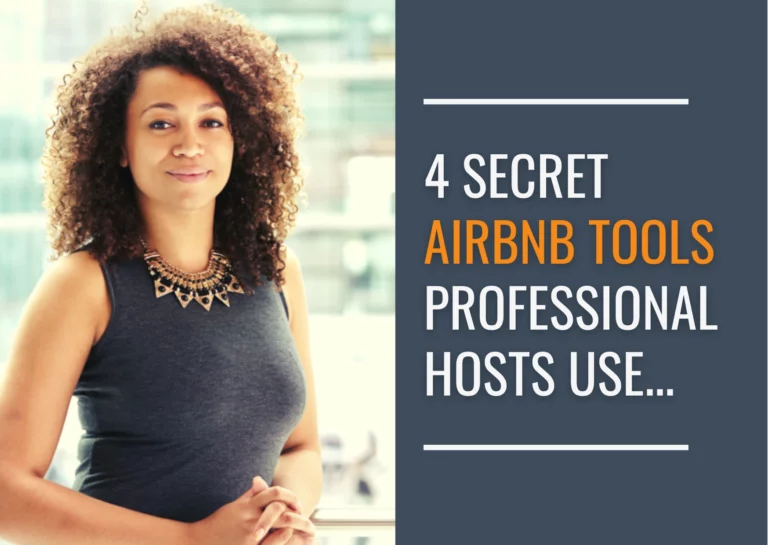Exploring Airbnb Luxe: A Guide for Hosts on Providing Luxury Accommodations
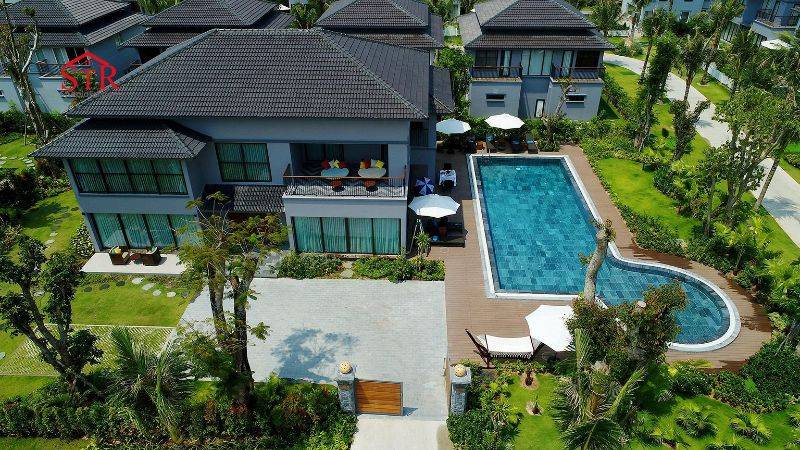
From humble beginnings as an air mattress rental service, Airbnb has grown into one of the largest online travel platforms, catering to diverse budgets and travel requirements. Now, homeowners with luxurious properties in sought-after destinations have the opportunity to tap into the affluent traveler market through the Airbnb Luxe program. Discover how you can leverage this platform to showcase your high-end property and cater to discerning guests seeking exceptional experiences. Unlocking Airbnb Luxe: Qualification and Getting Started With over 6 million listings worldwide, Airbnb offers a wide range of accommodations, including entire apartments, family homes, private rooms, unique tiny houses, cozy cottages, RVs, opulent mansions, glamorous glamping facilities, and even enchanting castles. However, regardless of the type of accommodation you provide, your success as a host hinges on your commitment to ensuring an enjoyable stay for your guests. This entails assuming numerous responsibilities and managing routine tasks, prompting many hosts to turn to vacation rental software like Hospitable for operational efficiency. Introducing Airbnb Luxe: Elevating Luxury Travel Experiences Airbnb Luxe represents a distinct category within the Airbnb platform, offering guests the opportunity to indulge in lavish accommodations and tailor-made experiences. This concept, known as “bespoke travel,” was introduced in 2019, following Airbnb’s acquisition of Luxury Retreats, a renowned provider of high-end rentals. Unveiling an exquisite collection of properties that surpass traditional vacation rentals, Airbnb Luxe presents a handpicked selection of the world’s most extraordinary dwellings. These meticulously vetted luxury rentals exude opulence, boasting 5-star amenities, impeccable service, and utmost privacy. Managed by Luxury Retreats, these properties epitomize unrivaled excellence. Yet, Airbnb Luxe extends beyond the realm of exceptional homes and prestigious locations. Each property offers a dedicated trip designer, an invaluable inclusion regardless of the nightly rate. These trip designers are available 24/7 and collaborate closely with guests, crafting tailor-made experiences that align with their unique preferences and desires. Qualifying for Airbnb Luxe: A Step-by-Step Guide If you own a luxury property and wish to apply for Airbnb Luxe, the process is straightforward. Begin by filling out the application form available at airbnb.com/luxury. Following this, an Airbnb Luxe representative will reach out to you to arrange an onboarding walkthrough conducted by a local Airbnb Home Consultant. During the walkthrough, the Home Consultant will meticulously review your property, adhering to a comprehensive checklist. They will assess the functionality of amenities, ensure the property is in excellent condition and ready to accommodate guests. Utilizing a mobile app, the consultant will document their findings, capturing notes and photographs of the entire property, including furnishings, kitchen amenities, appliances, and more. The insights gained from this visit will play a crucial role in Airbnb’s decision to include your listing and accurately portray your property. To meet the qualifications for Airbnb Luxe, your property must successfully pass a rigorous inspection encompassing over 300 criteria, satisfying standards related to interior design and functionality. Additionally, Luxe homes are evaluated based on their unique features, location, surroundings, and available services such as private chef, childcare, butler, driver, housekeeping, in-house massage therapist, and more. Within two business days following the onboarding walkthrough, you will receive feedback via email. If any issues are identified, it is essential to confirm your commitment to resolving them before progressing to the next stage of the onboarding process. The Luxe team collaborates with you to create Airbnb luxury listings that align with their internal formatting, ensuring a consistent user experience for travelers browsing the platform. Using the onboarding walkthrough report, professional photos of your rental property, and information from your listing’s website, the team will generate a draft listing on your behalf. This step typically takes three business days, after which the draft listing undergoes internal quality assurance. Subsequently, the draft will be shared with you for review, and specific requirements must be fulfilled before the listing can go live and begin receiving bookings. These requirements may include providing information about tax rates and permits, as well as confirming the presence of smoke and carbon monoxide detectors in your property. Once you have approved the listing and completed the necessary requirements, the Airbnb Luxe team will activate your listing and notify you via email. Your property will then be ready to accept reservations, opening doors to the world of Airbnb Luxe. Managing Your Luxe Listing: Best Practices and Communication As a Luxe host, you have the flexibility to update various details of your listing, including location, check-in and check-out instructions, house rules, house manual, and cancellation policies. Additionally, you can configure parameters for guest bookings. However, for modifications to listing details such as title, description, photos, services, amenities, or points of interest, it is necessary to contact the Luxe team for assistance. Guests have the option to directly book your Luxe property or utilize the Assisted Booking feature with the support of a trip designer. The management of your reservations will depend on whether you have enabled Instant Book or have chosen the Request to Book option in your booking settings. When a guest or a trip designer on their behalf submits a booking request for your Airbnb luxury rental, you will receive an email notification. If it is a guest-initiated request, you will have 24 hours to accept or decline before the request expires. In the case of a request made with the assistance of a trip designer, you will have 72 hours to respond. Until you accept or decline the pending request, the booking dates will be automatically blocked on your calendar. If you have enabled Instant Book, guests and trip designers can make bookings without prior communication. For Instant Book reservations, a trip designer will be assigned within 24 hours. Luxe trip designers play a vital role in delivering exceptional trip-planning services to guests, and your cooperation is crucial in ensuring a unique and memorable stay. Communication with both guests and trip designers should take place via the 3-way messaging feature in the Airbnb inbox throughout different stages of a guest’s trip. To uphold best practices as a Luxe host, it is advised to: Respond promptly to
Airbnb Interior Design: Here is Fastest Way To Get It Done!
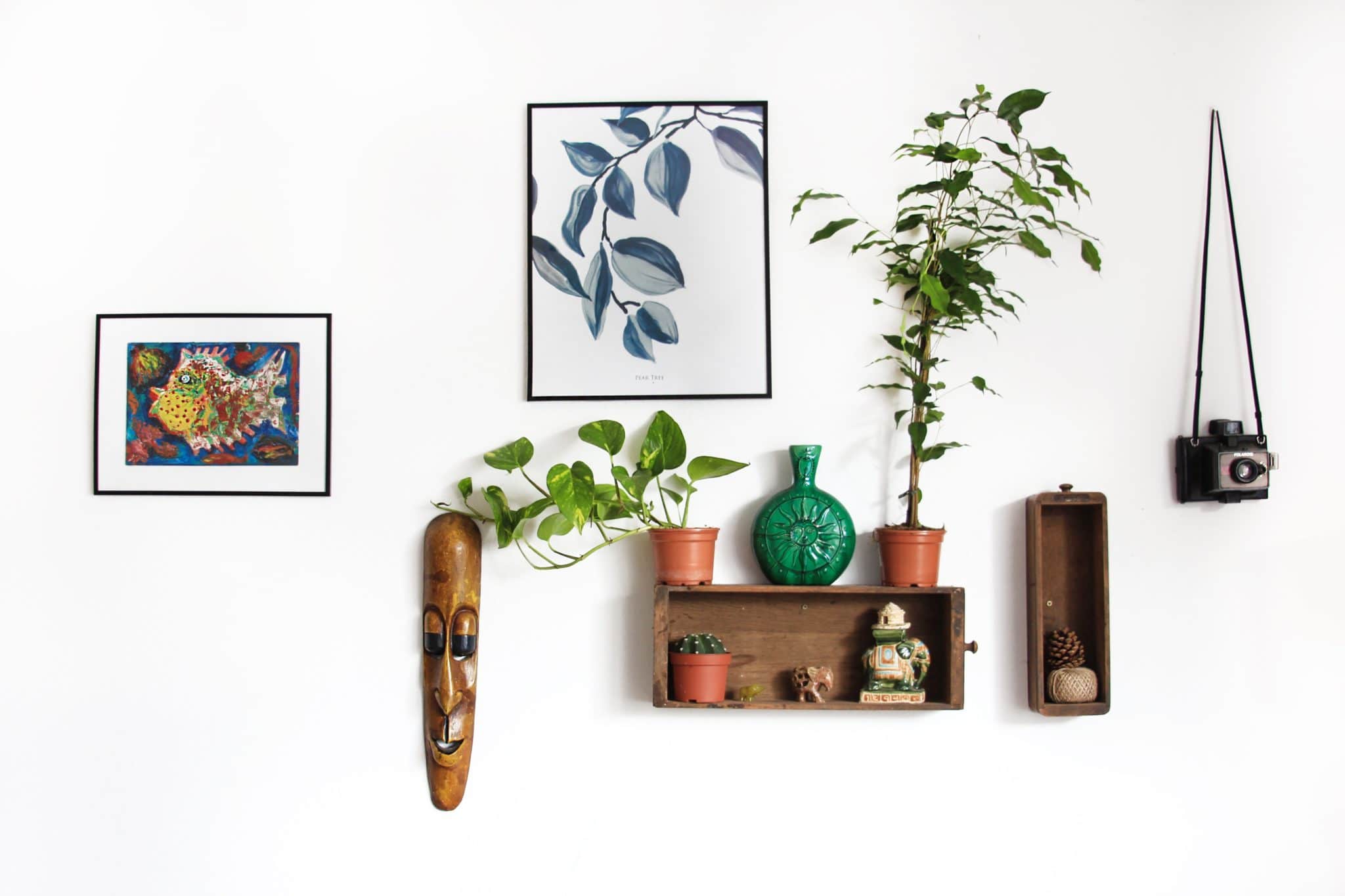
Wayfair, one of the largest online store for furnishings has announced that customers of its ‘Wayfair Professional‘ program, can purchase pre-designed fixtures and furnishing for Airbnb interior design with just a few clicks, taking away all the hassles of providing a space for short-term rentals cutting the lead times and costs significantly. All pre-designed rooms are fully-furnished by experts, including everything from the essential items to the smallest one. You can select from thoughtfully designed bedrooms, living rooms, dining rooms and more, maximised with highly functional products such as sleeper sofas, alarm clocks with USB ports, and smart locks, to suit a variety of renters’ needs. It is free to sign up for Wayfair Professional account and this service is only available in US. You will need a Business Name and Employer Identification Number (EIN) to complete the signup process. Airbnb Interior Design With Wayfair Professionals Step 1: The way it works is, head over to Wayfair Professional page, click here if you don’t have the link. Enter your Email ID and click ‘Join Free‘ on the first screen. Step 2: The following screen will come loaded with your Email ID, just enter your desired password and click ‘Continue‘. (The option ‘Create a new Wayfair Professional account‘ doesn’t work at the time of writing this blog) Step 3: Choose ‘Property Management‘ on the following screen. Step 4: Choose ‘Residential‘ on the next screen. Step 5: Enter your First name, last name, phone number and press ‘Continue‘ to the next stage of verification. Step 6: Next is the business verification page, enter your Business Name and Employer Identification Number (EIN). Your nine-digit Employer Identification Number (EIN) can be found on tax documents such as W-2s and 1099s. It will take about 48 hours to approve your trade account. Note: Business details don’t seem to be very important. As this is a new service and Wayfair seems to be very keen to enroll users to the platform, I got a call from them immediately after I submitted my request and the representative mentioned as long as I can provide a US address and phone number, they can sign me up for this service. Step 7: Once your membership is approved, you will get an email with subject ‘Welcome to Wayfair Professional!’ with the marketing graphics included When you click on ‘Shop Now’ button at the top, it will lead you to login screen and you can use your credentials provided in Step 2. Step 8: Once past the login screen, this pop up follows, choose ‘Accommodation’ here. After this you land at the home page of the Wayfair Professional website. Each option available in the menu is worth visiting, the prices are definitely different from the normal website. Step 9: Next, for airbnb interior designs, head over to the All Set Rooms section on the landing page, alternatively you can following this link. Just explore all the option available under each section, each room set is carefully designed by professionals to last for long in short term holiday lets, increasing guest experience many folds and taking the hassle of Airbnb interior designing at the same time especially if this is the first time you are doing it 🙂 Alternative: Handpicked Items for Airbnb I have created full list of items your will need for setting up your Airbnb from scratch, each item is handpicked and I have been using them for a long time. Please feel free to have a look at my recommended Airbnb shopping list. You may also like, Host On Airbnb With No Reviews – Should I Consider Another Booking?
Enhanced Solutions for Automated Messages in VRBO: Built-in Features and Superior Alternatives
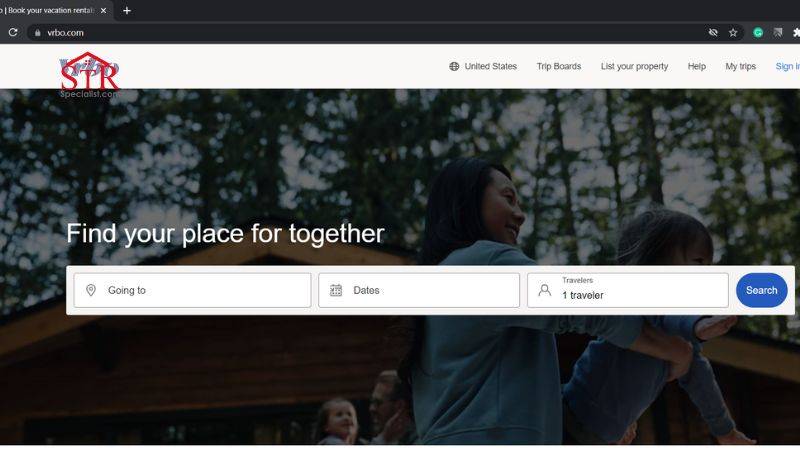
For vacation rental hosts on Vrbo, effective communication with guests is crucial for success. However, managing inquiries and guest interactions can be time-consuming. Meeting guests’ expectations for prompt responses is essential, as delays may lead to negative reviews. Automation of guest communication streamlines the process, saves time, and enhances the overall guest experience. While Airbnb offers automated messaging options, what about Vrbo? Let’s delve into Vrbo’s automated messaging features and discover viable alternatives for hosts on this popular rental platform. Simplify Your Vacation Rental Business with Vrbo Automated Messages For hosts juggling multiple responsibilities, managing a vacation rental can become overwhelming. What initially started as a side hustle can quickly transform into a full-time job. That’s why many hosts are turning to vacation rental software solutions like Hospitable.com to streamline their operations.Hospitable.com offers a comprehensive suite of features that automate various routine tasks, enabling hosts to reclaim their time. From guest communication and cleaner management to calendar synchronization and price updates across different channels, Hospitable.com empowers hosts to efficiently manage their vacation rental business. Discover the convenience of Vrbo automated messages and more with Hospitable.com. Streamlining communication is vital for busy Vrbo hosts, and automated messaging systems offer valuable support. While Vrbo provides some automated messaging functionality, it may not meet the expectations of a fully automated system. Vrbo’s automated messaging primarily focuses on mediated communication between potential guests and hosts before a booking is confirmed. When responding to booking requests, hosts can utilize two predefined templates: the “Available Template” for confirming availability and the “Non-available Template” for declining requests. These templates allow hosts to customize plain text messages, but they do not permit the inclusion of email addresses, phone numbers, images, logos, or HTML code. Any such content is automatically removed from the message. To simplify repetitive messaging, Vrbo hosts have the option to create custom email templates within their Inboxes. These templates can be personalized with tags for guest and host names, property ID, and relevant dates. Additionally, hosts can categorize templates, add attachments like check-in instructions, and save valuable time. While Vrbo’s messaging system provides some level of automation, exploring alternative solutions like Hospitable.com can offer even more advanced features to streamline communication and optimize the vacation rental hosting experience. Exploring Vrbo’s Scheduled Messaging Feature Scheduled messages play a crucial role in efficiently sharing essential rental information with guests, saving time and ensuring a seamless experience. But does Vrbo offer the functionality to create and send scheduled messages automatically? Vrbo does provide a scheduled message feature in the form of an automated email containing the welcome guide information. This message is sent to guests seven days prior to their check-in date, enhancing their overall experience. The welcome guide encompasses all the necessary details guests need to know about their stay. With this automated welcome message, hosts are relieved of the task of manually sending welcome letters for each Vrbo booking. The welcome guide information is conveniently accessible through the Vrbo app and website, exclusively shared with confirmed reservation guests. Hosts have the opportunity to tailor a personalized welcome message for each of their Vrbo properties. This message should include crucial information like property directions, contact details, parking instructions, check-in/out procedures, house rules, and amenity usage guidelines. While Vrbo’s automated messaging capabilities are limited, hosts can elevate their guest experience and simplify their lives by leveraging vacation rental management software such as Hospitable. By automating all Vrbo messages, from booking to check-out and review requests, hosts can efficiently keep guests informed at every stage. You may also like: Top 100 Airbnb Name Suggestions: Unleashing Creative Ideas Top Picks for Enhancing Your Rustic Airbnb Experience
Top 5 Guest-Favorite Items to Offer for Sale in Your Airbnb
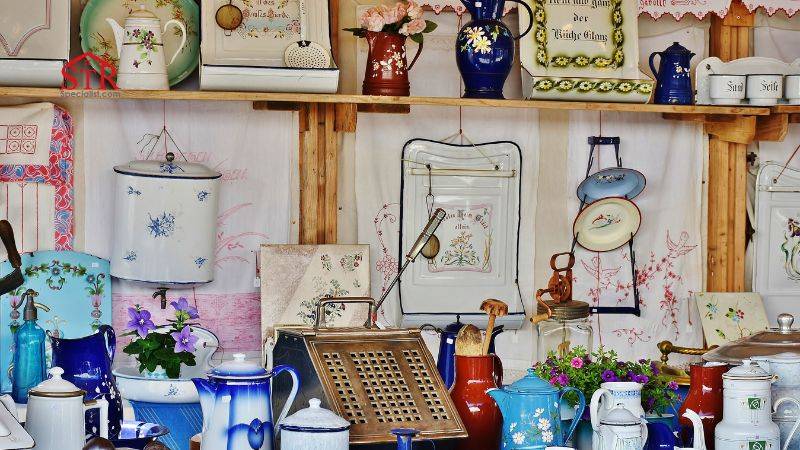
As short-term rental hosts, we constantly seek ways to grow our business, increase revenue, and create extraordinary hospitality experiences. One highly effective approach to achieving all these objectives is by offering items and services for sale to our guests. From delightful fresh flowers and convenient midweek cleaning services to handy rentals and even phone chargers, the possibilities are endless. By selling or renting these desirable extras, we not only provide an exceptional experience that guests adore but also establish an additional source of income. The result? Glowing 5-star reviews that commend our meticulous attention to detail and rave about how we went above and beyond. Trust us when we say this: If you stock your listing with essentials like Advil and Gatorade, not only will guests gladly purchase them, but they’ll also leave reviews expressing how you saved the day. Unlock the secrets of successful upselling in the short-term rental industry. As both hosts and property managers, we developed a groundbreaking service that automates upselling to guests. What began as a side-hustle has evolved into a thriving business, with nearly 1,000 hosts generating over $500 in additional monthly income per listing. Effective upsells and rentals go beyond mere add-ons; they should exude elegance and offer genuine value. It’s not about nickel and diming guests but rather providing exceptional extras that go above and beyond, such as late-night firewood delivery, a stocked freezer of delectable snacks, kayak rentals, or the option to schedule a pre-arrival massage. Hotels have long understood the importance of selling “the experience, not just the room,” and it’s time for the short-term rental industry to follow suit. Now, you may wonder what exactly you should sell in your listing. Fear not, as we’re here to provide you with the ultimate Airbnb-hack, Airbnb host-shop, and VRBO-ready insider tips based on thousands of successful guest sales. Get ready to elevate your offering and maximize your revenue potential. 1. Enhance Your Stay with Pre-Arrival Services: Mid-Stay Cleaning, Birthday Party Decor, Pantry Stocking, and Fresh Flowers When guests make a booking, they often experience a surge of “I just spent a lot of money” adrenaline. This presents a golden opportunity to offer helpful pre-scheduled services that not only assist them but also enhance their overall impression. Imagine treating your guests to a delightful bouquet of flowers as they arrive, setting the perfect centerpiece for a weekend getaway with Mom. The demand for one of our recent top sellers in this realm speaks for itself: mid-stay cleaning. And here’s the best part: our advanced technology not only handles the scheduling but also notifies your cleaner, ensuring a seamless experience for everyone involved. 2. Essential Items They Might Have Forgotten – Phone Charger, Sunblock, Toiletries We’ve all experienced that sinking feeling when we reach our destination, start unpacking, and realize that one essential item we can’t live without is missing. But fear not, because we have a solution for you! Discover the convenience of our on-site store, where you’ll find a wide range of items that guests often forget, run out of, or misplace. From phone chargers and sunblock to toiletries and extra beach towels, we have you covered. Need firewood, propane, chapstick, or drink mixers? We’ve got those too! Say goodbye to those moments of despair and rely on our store to provide the essentials you need for a worry-free stay. 3. Recover and Recharge: Catering to Guests in Need of Hangover Remedies When it comes to hosting guests, you never know who might be checking in (although it’s essential to have clear house rules to avoid unwanted parties). Oftentimes, guests wake up after a night of celebration and find themselves in need of hangover relief such as pain relievers, hydration solutions, protein bars, and more. So why not provide them with a helping hand on their road to recovery? If you’ve ever experienced a hangover yourself, you understand the value of having access to essentials like Advil, which you’d gladly pay a premium for when you’re truly in need. 4. Souvenirs and Local Products Capture Memories: Local products like coffee, tote bags, hats, soaps, and more always have high demand. Anything that bears the name of your city or specifically your rental property sells like hotcakes. Guests are eager to take home a piece of their experience (after all, “souvenir” comes from the French word for “to remember”). They prefer authentic local items over last-minute airport purchases. One of our hosts even sells unique local college Christmas ornaments and has already sold five in just the first two weeks of July! 5. Unique Rentals Think outside the box: Beyond the standard rentals like bikes and kayaks, consider offering unconventional options like margarita machines, a closet full of dress-up western wear (perfect for Instagram-worthy moments), or a complete outdoor movie night setup. Get creative and cater to your guests’ unique interests! A tip for hosts: Ensure your guests sign any necessary insurance waivers before using these rentals. Bonus: Late Check-Out A little extra time goes a long way: At least half of our guests request a late check-out at our rental properties. And when we offer this service for a fee, they are delighted! Late check-out and early check-in options account for around half of all sales on our platform (with most hosts charging approximately $50). It’s an easy way to provide added value to your guests. We have plenty more product ideas, and we’d love to hear yours too. Reach out and let us know what you’d like to sell! Check out our website for more information, instructional videos on getting started, and a wealth of ideas on what to offer. Setting up your store takes less than five minutes, and you can easily integrate it into your guest book and automated messaging. Set it up once and let it run in the background. Oh, and here’s a fun fact: Yoga mats are consistently one of the weirdest items that sell well. It seems people are quite particular about their personal space during stretching sessions.
Top 100 Airbnb Name Suggestions: Unleashing Creative Ideas

Captivating Airbnb names and eye-catching listing photos go hand in hand to attract more guests to your rental. As the first impressions guests have, a compelling listing name can make them pause their scrolling and take notice of your vacation property. Having a distinctive property name increases the likelihood of guests remembering it. If they search for it online, your listing will appear at the top of the search results. Moreover, your Airbnb’s name serves as a gateway for guests to find your social media accounts and vacation rental website, while also aiding accurate word-of-mouth recommendations. With countless possibilities and the need for thoughtful creativity, we’ve curated an extensive collection of the finest Airbnb names to inspire you. Alongside these suggestions, we’ve included valuable tips to assist you on your naming journey. Differentiating Listing Titles and Airbnb Names: Understanding the Distinction It’s common for people to confuse the Airbnb name with the listing title, but in reality, they serve distinct purposes. The Airbnb name refers to the unique identifier for your property rental, while the listing title provides a concise description within the 50-character limit. The listing title typically highlights the key selling points of your property, such as “Explore the West Loop from an Artist’s Loft.” To delve deeper into crafting compelling listing titles, refer to our comprehensive guide on “How to Write the Best Airbnb Listing Titles.” In contrast to the listing title, an Airbnb name represents a distinct and personalized designation for your property, playing a crucial role in establishing its unique brand identity. While Airbnb does not mandate naming your listing, an exceptional name can propel you from being a small fish in a vast sea to an unmissable shark. Utilizing your Airbnb name across your website and social media accounts, as well as in word-of-mouth recommendations, ensures its memorability and recognition. While the rental name does not necessarily have to be descriptive, it can be infused with creativity and originality. On the other hand, the listing title should clearly depict the essence of your property, enabling guests to grasp what you have to offer. Crafting an Unforgettable Airbnb Name: A Simple 10-Step Guide When naming your unique rental, the process can feel overwhelming without a starting point. To help you navigate this creative journey, we have outlined 10 straightforward steps that will guide you toward finding the ideal name: 1. Embrace simplicity: Opt for a short and memorable name that is easy to pronounce, ensuring broad appeal. Consider playful alliterations, such as Lakeview Lodge or Bonny’s Boho Beachhouse. 2. Seek inspiration: Analyze the names of other listings to spark ideas and gather inspiration for your own distinctive name. 3. Highlight unique qualities: Focus on the exceptional attributes that set your Airbnb apart, such as amenities, history, location, functionality, or aesthetics. Examples include Sandy Beachfront Oasis, Window to the Duomo (featuring a view of the Duomo cathedral), or 19th Century Schoolhouse. 4. Compile descriptive words: Create a list of nouns and adjectives that effectively describe your property’s characteristics. 5. Utilize name generators: Consider utilizing Airbnb name generators like BizNameWiz or Shopify to explore potential name variations based on specific keywords. 6. Avoid generic terms: Steer clear of generic names that lack individuality or fail to capture the essence of your rental. 7. Eliminate potential complications: Minimize the use of negative words, numbers, and hyphens, as they can impede search engine optimization and hinder your visibility in Google search results. 8. Shortlist your favorites: Narrow down your options to a shortlist of 5-10 preferred names and check for their availability among competitors. 9. Check domain name availability: Even if you don’t plan to create a website immediately, verify the availability of the corresponding domain name using platforms like NameChekr, GoDaddy, or Namecheap, as you may want to establish an online presence in the future. 10. Ensure trademark safety: Confirm that your chosen name does not infringe on any existing trademarks to avoid potential legal complications. Creative Airbnb Name Ideas: Inspiring Examples for Your Rental To ignite your imagination and guide you towards creating a captivating, descriptive, catchy, humorous, romantic, or dreamy name, exploring the creativity of others can be immensely helpful. Delve into these Airbnb name ideas and examples, serving as a wellspring of inspiration for crafting a distinctive name that perfectly reflects your unique rental:- Artisan’s Haven Enchanted Rose Cottage Sunbeam Retreat Serenity Haven Urban Loft Oasis Vibrant Getaway Tranquil Forest Retreat Southern Hospitality Cottage Onyx Lakeside Retreat Cozy Haven Retreat Serene Hideaway Restful Haven Coastal Sands Retreat Secluded Sanctuary Historic Elegance Retreat Desert Paradise Retreat Coastal Getaway Villa Scenic Lake Retreat Coastal Peninsula Escape Quaint Deerfield Bungalow Tranquil Urban Escape Lakeside Haven in Maine Christopher’s Cozy Retreat Serenity Hideaway Coastal Serenity Cottage Stylish Boutique Retreat Brooklyn’s Charming Getaway A-Frame Tranquil Retreat in Hood River Charming North Retreat Riverside Cozy Cabin Stylish Penthouse in Brooklyn Mountain Bliss Retreat Secluded Hideaway on the East Shore Artistic Loft in Chinatown Coastal Paradise Estate Cozy Bungalow on 7th Avenue Quaint Black Shack Retreat Haven of Bliss Hidden Gem in Westside Enchanting A-Frame Escape Charming Manor on James St. Stylish Abode in Williamsburg Beachside Haven in Maui Sunset Paradise Retreat Coastal Beach House Haven Cozy Cottage by the Buttonbush Charming Home Sweet Home Waterside Floating Retreat Elevated Cabin Retreat Serene Ruby Garden Oasis Delightful Eastside Getaway Tranquil A-Frame Escape in Idyllwild Beachside Oasis on Sandy Shores Collective Retreat on the Hill Colonial Charm in the North Serene Glen Getaway Cozy Tranquil Haven Exquisite Jewel in Hawthorne Luxurious Estate in Hollywood Hills Coastal Gem at Pacific Beach Secluded Bungalow Retreat in Palm Springs Guru’s Haven Retreat Serene Hideaway in LA Highlands Historic Brownstone Retreat owned by the Johnstons Enchanting Aurora Retreat Escape to Miami Retreat Hidden Gem on Pennsylvania Avenue Now’s Home Retreat Rustic Cabin Nestled in Tanglebloom Cozy Lodge in the Countryside Premium Retreat Cabin Charming Haus on Cobb Street Urban Oasis in Downtown Cozy Bungalow on Baker Avenue Riverside Cabin Retreat Cozy Cabin with Little Owl Charm Charming Darby Retreat Historic
Top Picks for Enhancing Your Rustic Airbnb Experience
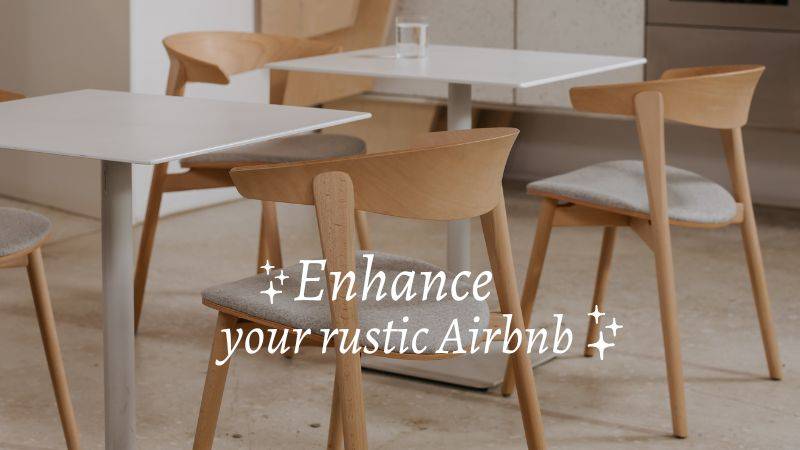
So, you own a serene Airbnb property nestled far from the city’s clamor, and you’re aware that your accommodation offers the perfect respite for guests seeking to rejuvenate. To attract a larger audience, promoting your Airbnb with a ‘rustic’ theme could heighten the sense of tranquility. The term ‘rustic’ often conjures images of simplicity, echoing a more uncomplicated lifestyle. To infuse your property with an extra dose of charisma, selecting appropriate elements that contribute to the ambiance of a rustic retreat could be key. Below, you’ll discover suggestions that will infuse your accommodation with a distinct rustic personality. These items vary from tables to lighting fixtures, representing only a fraction of the plethora of options available on Amazon. 1. Signature Design by Ashley Bennox dining table The Signature Design by Ashley Bennox 5 Piece Counter Height Dining Set is a thoughtfully curated set that combines functionality with style. This ensemble, rendered in a warm brown color, includes a table and four barstools. With its streamlined, contemporary design, this counter-height set is perfectly suited to spaces where casual dining and entertaining are key. The durable construction assures longevity, while the comfortable barstools provide ample seating space. This dining set is not just a piece of furniture, but an investment in comfort and elegance, perfect for enhancing your Airbnb property with a touch of rustic charm. 2. Rolanstar tree bookshelf The Rolanstar Tree Bookshelf is a distinct and innovative storage solution that combines functionality with a dash of rustic charm. Mimicking the aesthetic of a tree with branching shelves, this bookshelf adds a unique and organic touch to any space. It’s not only a stylish way to display your books, but also an excellent decor piece that works well in diverse settings – from a rustic Airbnb to a contemporary city apartment. Built with sturdy materials, this tree bookshelf offers several tiers of storage space, providing ample room for books, collectibles, and decorative items. The Rolanstar Tree Bookshelf is a testament to creative design, making it an attractive addition to any home or rental property. 3. Madison Park Signature All Season Bedding The Madison Park Signature All Season Bedding offers the perfect blend of luxury and comfort, designed to cater to your needs throughout the year. This bedding collection boasts a versatile design that adapts to varying climates, ensuring you stay comfortable whether it’s the peak of summer or the depths of winter. Crafted with attention to detail and quality materials, these linens provide a plush feel and lasting durability. From crisp sheets to cozy comforters, Madison Park Signature All Season Bedding is designed to enhance the sleep experience. Its elegant style lends a touch of sophistication to any bedroom setup, making it an excellent choice for a rustic Airbnb or any home seeking to elevate its bedding ensemble. 4. Leigh Country TX 95100 Aspen Single Rocker The Leigh Country TX 95100 Aspen Single Rocker is a beautifully designed piece of furniture that combines comfort with a touch of rustic charm. Handcrafted from Aspen wood, it provides a sturdy and durable seating solution that’s perfect for both indoor and outdoor spaces. With its slatted design and a contoured seat for extra comfort, this rocking chair invites relaxation. The natural finish highlights the beauty of the wood grain, making each piece unique. Whether placed on a porch, in a living room, or a rustic-themed Airbnb, the Leigh Country Aspen Single Rocker adds a traditional touch and a cozy feel, embodying the spirit of simpler times and slower paces. 5. Jinchan Traditional Rug The Jinchan Traditional Rug is an exquisite piece that beautifully merges classic design elements with contemporary aesthetics. This rug, adorned with sophisticated patterns, introduces a timeless charm to any room it graces. The harmonious blend of colors ensures that it can seamlessly fit into a variety of interior design styles, be it rustic, modern, or traditional. Built with durability at its core, the Jinchan Traditional Rug can easily withstand high-traffic areas while preserving its allure. Its plush fabric offers a comfortable surface, adding to the overall comfort and warmth of the space. Whether used to elevate the look of a rustic Airbnb or to enrich your home’s interior, this rug serves as a chic and functional addition. 6. Eliteart-Old Vintage World Map The Eliteart-Old Vintage World Map is a stunning reproduction of oil painting, printed on high-quality canvas and offering a captivating glimpse into the past. Measuring 39″ x 28″, it’s framed and ready to enhance any wall space. The vintage world map, with its intricate detailing and aged aesthetics, evokes a sense of nostalgia and wonder. Its giclee printing technique ensures a high-resolution image that captures the original oil painting’s textures and colors. This piece of wall art is not just a decoration; it’s a conversation starter, perfect for any home, office, or rustic Airbnb. It merges art, history, and exploration in a visually stunning display, adding character and depth to your decor. 7. Monopoly Board Game The Classic Edition The Monopoly Board Game Classic Edition is a timeless and engaging game that brings together friends and family for hours of strategic fun. This version retains all the original features that have made Monopoly a household name for generations, including the iconic game pieces, traditional properties, and even the money. Players can engage in buying, selling, and trading properties while aiming to build their own real estate empires. The Monopoly Classic Edition is not just a game, but a tradition that introduces concepts of economy and negotiation in an entertaining way. It’s a perfect addition to family game nights, gatherings, or a rustic Airbnb stay, providing entertainment that appeals to both kids and adults. 8. Vintage Style Decorative Lantern The 11″ Vintage Style Decorative Lantern, with its Flame Effect LED, is a charming addition to any space seeking a touch of nostalgia and ambiance. Crafted in a rustic design, this lantern infuses the elegance of yesteryears with modern technology. The LED flame effect mimics the comforting glow of a
The Evolution and Outlook of Sales, Marketing, Branding, and Revenue Management in Airbnb and the Hotel Industry
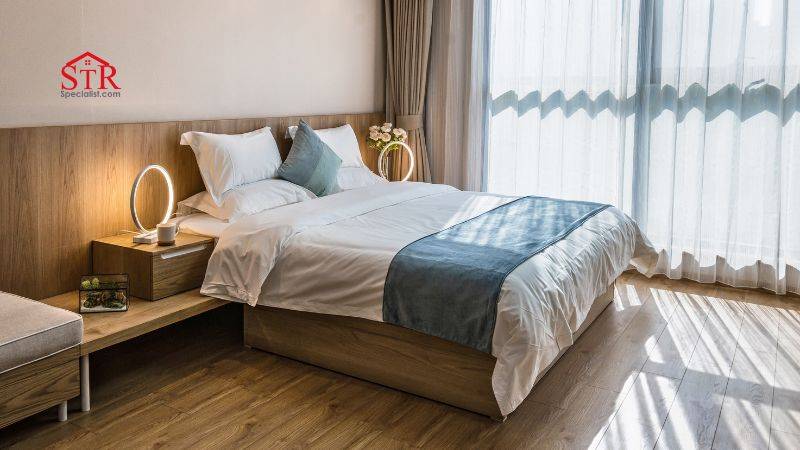
Initially dismissed as non-threatening, Airbnb has since emerged as a dominant force in the hospitality industry, surpassing many traditional hotel companies in size and influence. What began as a narrative of distinct markets and business models has evolved dramatically. The hotel industry, once complacent, now recognizes the need to address the rise of Airbnb. This shift in perception led to a phase of denial, followed by the American Hotel & Lodging Association (AH&LA) actively challenging Airbnb. The association sponsored research highlighting the negative economic impacts of home-sharing and advocated for government regulations and taxes. Seeking a level playing field, the AH&LA rightly argued for fair competition between home-sharing and hotels. The ensuing battleground involves both competition and integration. Hotels are no longer content to simply compete with Airbnb; they are actively incorporating home-sharing-like attributes and experiences into their properties to effectively rival the platform. Moreover, hotels are exploring the platform-based business model that underpins Airbnb’s success, aiming to tap into its advantages. The ongoing struggle between the hotel industry and Airbnb signifies a profound transformation in the hospitality landscape. The Impact of Airbnb on the Hotel Industry: Exploring its Historical Significance Airbnb’s influence on the hotel industry is far-reaching, affecting both its existence and economic landscape. In a study conducted by Dogru, Mody, and Suess (2018), it was revealed that a mere 1% increase in Airbnb supply in ten prominent U.S. hotel markets from 2008 to 2017 led to a 0.02% decrease in hotel Revenue per Available Room (RevPAR) across all segments. While this initial impact may seem modest, considering Airbnb’s exponential growth rate of over 100% annually during this period, the actual decline in RevPAR amounted to a substantial 2% across all hotel segments. Remarkably, even the luxury hotel segment experienced a significant 4% decline in RevPAR due to Airbnb’s supply expansion. The effect on Average Daily Rate (ADR) and occupancy was less severe, but the consequences were still noteworthy. In Boston, for instance, Airbnb’s supply growth resulted in an average 2.5% decrease in RevPAR over the past decade. In 2016 alone, this decline equated to a staggering $5.8 million in revenue lost by hotels to Airbnb. Particularly affected were midscale and luxury brands, witnessing respective decreases of 4.3% and 2.3% in RevPAR. These supply increases have also fueled Airbnb’s growing share of the accommodation market. In Q1 2016, Airbnb accounted for 9.7% of accommodation demand in New York City, equivalent to approximately 8,000 rooms per night, constituting nearly 3% of all traditional hotel demand during the same period. With over 4 million listings and a growth rate exceeding 100% annually, Airbnb has become a formidable player, primarily in its largest market, the United States. While it faces competition from local rivals like Tujia and Xiaozhu in China, Airbnb continues to seek opportunities for growth, particularly in emerging markets such as Africa and India. However, it is important to note that Airbnb’s growth trajectory is projected to eventually plateau as it reaches a saturation point (Ting, 2017a). To counter this, the company has adopted alternative strategies to expand its supply, including partnering with property developers to transform entire buildings into potential Airbnb units through its Niido brand. Niido encourages tenants to list their units on Airbnb, with both Airbnb and Niido sharing 25% of the generated revenue. Furthermore, Airbnb has expanded its target audience beyond its original market by appealing to segments traditionally pursued by hotels. This is exemplified by offerings like Airbnb Plus, which provides verified high-quality homes with premium amenities, as well as Airbnb Experiences, offering unique and unconventional activities to travelers. In conclusion, Airbnb’s impact on the hotel industry has been profound, challenging traditional market dynamics and prompting hotels to reassess their strategies. As Airbnb continues to evolve and pursue innovative approaches, such as Niido and targeted product offerings, the future of the hotel industry will undoubtedly be shaped by the ongoing competition and shifting dynamics between Airbnb and traditional hotel companies. Unraveling Consumer Desires: The Key Battleground Between Hotels and Airbnb in the Present Era The current travel landscape is influenced by broader societal trends that significantly impact consumer preferences. These trends include: The Rise of “New Luxury”: There is a growing demand for unique and authentic experiences that foster self-actualization, driven by an increasing wealth gap in the United States. Increased Mobility: Previously underrepresented groups, such as the black travel movement, along with a surge in international travelers from countries like India and China, are contributing to a greater sense of mobility and diversity in travel. Evolving Brand Loyalty: Traditional long-term brand loyalty is giving way to consumers’ desire for instant gratification and personalized experiences, challenging hotels and Airbnb to adapt to these changing expectations. Redefining Ownership: In a post-consumerist society, the focus has shifted towards access-based consumption, emphasizing wellness and well-being over material possessions. The Blurring of Work, Play, and Life: Technology has transformed the way we live, work, and connect with others, leading to a convergence of various aspects of life. This trend, combined with the upcoming 5G and Internet of Things (IoT) advancements, accelerates the pace of change and integration. Considering these trends, marketers and experience designers must rethink the concept of the travel experience for customers. The idea of the experience economy, introduced by Pine and Gilmore in 1998, encompassed dimensions such as escapism, education, entertainment, and aesthetics. However, Airbnb has revolutionized the experience economy by emphasizing the sharing lifestyle and fostering a sense of community, aligning with the highlighted trends. As a result, six additional dimensions have emerged in the context of the travel experience: personalization, communitas, localness, hospitableness, serendipity, and ethical consumerism, as identified by Mody in 2016. These trends and dimensions highlight the need for both Airbnb and hotels to adapt their strategies to meet evolving consumer expectations. By embracing and incorporating these trends into their offerings, both hospitality sectors can create memorable experiences, cultivate brand loyalty, and effectively compete in the dynamic travel market. A comprehensive study conducted by Mody and colleagues (Mody, Suess, & Lehto, 2017) reveals that
15 Excellent Interior Decor Ideas Every New AirBnB Host Must Explore
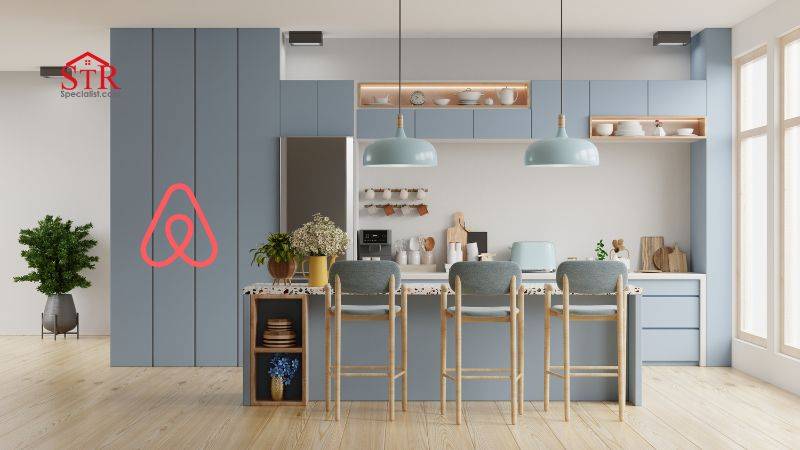
Curating the design for your AirBnB might seem daunting, particularly if you’re struggling for creativity. One effective strategy to kickstart your process is to hunt for motivation in appropriate spots. Here’s a concise overview of 15 fantastic interior design suggestions, sourced from seasoned AirBnB hosts. 1. Embrace Glamping Who claims that camping needs to be dull? Consider this rental that elevates “glamping” into a distinct category. This property seamlessly merges the essence of the wilderness with contemporary and trendy aesthetics. Here’s some insight from a fellow AirBnB host: “Recognize your target audience and tailor your design accordingly. While we could have catered to fishers, we decided to craft an experience for families. The design, brought to life by my daughter, appealed to our chosen demographic. Secondly, infuse it with variety. We incorporated elements from our family trips to Italy, France, Croatia, and Crete. These personal touches lend longevity to the design as it doesn’t hinge on a singular design style. It’s more comprehensive. We purposely avoided the stereotypical “cabin” feel with bulky wooden furniture and pine wood. Instead, we provided something that caters to diverse tastes.” 2. Embody Cabin Elegance If you’re considering another approach to glamping, adopting a ‘cabin elegance’ style for your rental could be the way to go. This choice is particularly excellent if your property is nestled among forests and lakes, and you aim to maintain the warm, homey atmosphere of a cabin. An inspiring instance comes from an Airbnb host who succeeded in blending contemporary touches while keeping their rental welcoming. “I rely on Pinterest and mood boards to shape my vision. This one was designed during the Covid period, so I aimed for cleanliness and a white aesthetic but with a cabin’s touch. I dub it, ‘cabin elegance’!” 3. Coastal Vibes Incorporating a beach theme can be a delightful touch to a rental, particularly if your property is situated near the coast. The trick, however, is to keep it subtle and not go over the top. Opt for hints of summer hues and light blue accents around the room, but keep the primary colors of the majority of your furniture to light brown and white. If you’re hesitant about incorporating a seaside theme throughout the property, consider adopting it for a single room. For instance, many hosts find beach-inspired AirBnB interior design ideas particularly suitable for bathroom decor. 4. Embrace Simplicity When you’re uncertain but still want to achieve a sleek look, opting for a minimalist theme is a fail-safe choice. This becomes even more significant if your rental features impressive architecture you’d like to spotlight. Consider this insight from a host who believes in minimalism for their rental: “Opt for minimalism to allow the art and architecture of the space to truly stand out.” 5. Incorporate a Standout Element Suppose you’ve opted for a minimalist aesthetic for your rental, but it feels like it’s missing a unique touch. Thankfully, there’s no need to overhaul the entire space to infuse some charm. A single standout item can elevate a room’s luxury feel. For instance, one statement vase or art piece can become the room’s focal point. Even coloring one wall a different hue can add significant depth and interest. 6. Comforting and Cozy Some guests are looking for a rental that replicates the comforting ambiance of their own homes. So, why not curate your rental to provide that same familiar feel? If you appreciate your actual home’s design and atmosphere, you can mirror that in your rental property. Here’s an inspiring example from a host who designed their welcoming AirBnB with this in mind: “I initially designed this space as my personal home, reflecting how I want my own house to look and feel.” 7. Child-Friendly Design Many guests seek rentals that accommodate children, but you may have concerns about youngsters potentially damaging your decor. Fortunately, there’s a solution. Consider statement pieces such as vintage lighting fixtures that are out of children’s reach. For a kid-friendly touch, add exciting elements like a chalkboard wall in one of the rooms. 8. Vintage Appeal Who said all remarkable AirBnB interior design ideas have to break the bank? You can create a stunning look while sticking to a budget by choosing vintage furniture, an aesthetic that many appreciate. Your best options for vintage pieces are items crafted from metal, leather, and wood, as they not only look fantastic but also stand the test of time. 9. Highlight Local Attractions Is your AirBnB surrounded by numerous amenities? Don’t hesitate to flaunt it! Many guests are attracted to rentals located near fun activities, especially if the property’s theme complements that. For example, this ski lodge embraces a cozy, summer ambiance paired with charming “lodge” aesthetics. “I take great pride in my quaint AirBnB situated near a ski mountain, and I’ve decorated it to match that theme!” 10. Infuse a Burst of Color If you’re apprehensive about colors clashing, there’s no need to worry. You can maintain a largely neutral color scheme for most of your furnishings and then introduce a few accent hues for a vibrant pop. For example, if your primary colors are white, black, and grey, consider using red throw pillows to make your room feel more dynamic and lively. 11. Support Local Craftsmanship One of the most impactful AirBnB interior design ideas is to prioritize local sourcing. While it may not constitute a design theme per se, it’s an affordable and highly effective way to embellish a rental tastefully. Consider this advice from an AirBnB host who adopted this approach in their property. “Collaborate with as many local artisans as possible! We partnered with our local Amish community for all cabinets, trim, flooring, and even 200-year-old barn beams! Not only was the pricing reasonable, but the quality is also exceptional.” 12. Accentuate with Floor Decor Many tend to overlook the potential of using floors as a canvas for decoration. A simple accent rug could be all it takes to pull a room together. For example, a vibrant, eclectic rug can inject life
The Best Smart Locks for a Successful Airbnb Business: Key Features, Pros & Cons
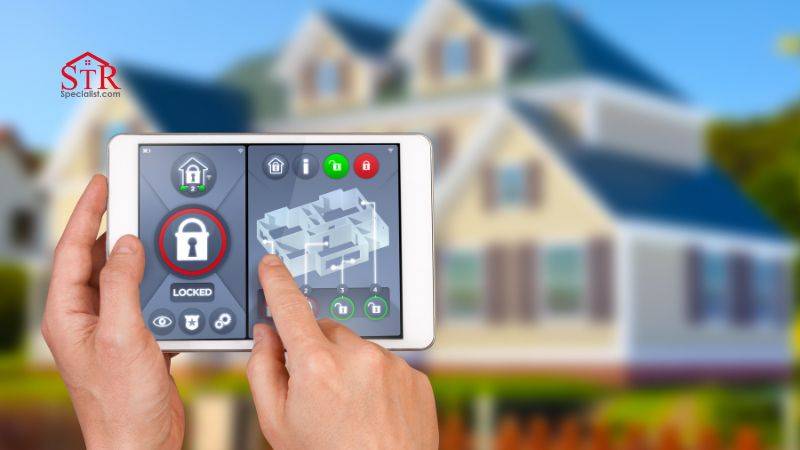
As an expert in managing Airbnb properties, I understand the importance of security, convenience, and ease of access for both hosts and guests. One of the key components to achieving this is by installing a smart lock on your rental property. In this article, we will explore the best smart locks for Airbnb hosts, focusing on key features, as well as the pros and cons of each option. August Wi-Fi Smart Lock (4th Generation) Key Features: Airbnb integration for automated access code generationRemote monitoring and controlEasy installationDoorSense technology for monitoring door status Pros: Seamless Airbnb integrationRemote access and monitoringCompatible with most standard deadbolts Cons: Requires Wi-Fi connection for remote featuresBattery life may be shorter with frequent use Schlage Encode Smart Wi-Fi Deadbolt Key Features: Supports up to 100 unique access codesFingerprint-resistant touchscreenRemote locking and unlockingBuilt-in alarm technology for added security Pros: High number of access codesFingerprint-resistant touchscreenBuilt-in alarm Cons: No direct Airbnb integrationRequires Wi-Fi connection for remote features Yale Assure Lock SL with Z-Wave Key Features: Z-Wave technology for smart home integrationTouchscreen keypadSupports up to 250 unique PIN codesTamper-resistant battery cover Pros: Sleek, key-free designLarge number of unique PIN codesCompatible with various smart home systems via Z-Wave Cons: No direct Airbnb integrationRequires a compatible smart home hub for remote access and monitoring Lockly Secure Pro Key Features: Fingerprint scanner for added securityTouchscreen keypadRemote lock and unlock via the Lockly appOffline access code generation Pros: Fingerprint scanner for enhanced securityOffline access code generationRemote control via the Lockly app Cons: No direct Airbnb integrationHigher price compared to other options Kwikset Halo Wi-Fi Smart Lock Key Features: Supports up to 250 unique access codesFingerprint-resistant touchscreenRemote locking and unlockingTamper-resistant battery cover Pros: Large number of unique access codesRemote control and monitoringFingerprint-resistant touchscreen Cons: No direct Airbnb integrationRequires Wi-Fi connection for remote features Conclusion Choosing the best smart lock for your Airbnb property depends on your specific requirements and preferences. Consider factors such as integration with the Airbnb platform, remote access and monitoring, and the number of unique access codes supported when making your smart lock selection. Enhance property security and streamline guest check-in for an exceptional stay experience. You may also like, How to Set Airbnb Rates: A Comparison of Pricing Strategies Safeguarding Your Airbnb Against Smoking and Noise Concerns Houst: The Unrivaled Airbnb Property Management Company How to Write Titles for Airbnb Listings That Get More Bookings
Establishing an LLC for Airbnb Hosting: A Guide to Forming Your Business
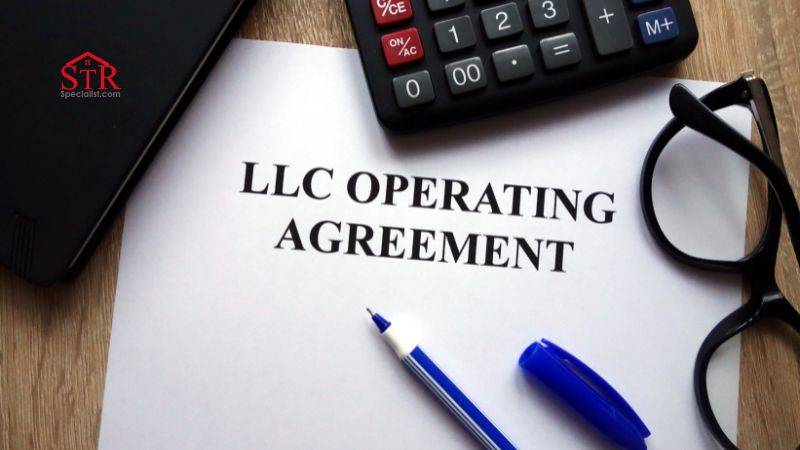
The prospect of renting out your property on Airbnb to international guests for short-term accommodation can be a lucrative endeavor for homeowners. However, this business venture also comes with potential risks such as personal liability and additional tax responsibilities. Establishing a Limited Liability Company (LLC) for your Airbnb could be an effective strategy to provide an extra layer of protection for your personal assets and offer tax advantages. If you’re an Airbnb host contemplating the formation of an LLC, this resource provides a basic understanding of setting up an LLC for Airbnb within the US context. But remember, numerous factors specific to your situation need careful thought. It’s highly recommended to engage a legal professional who can guide you through the legislation pertinent to the location of your Airbnb operation. 1. Does Airbnb Hosting Qualify as a Business? A significant number of people are monetizing their properties by listing them as vacation rentals on Airbnb, VRBO, and other OTA platforms. Some hosts use this as a supplementary income stream, while others fully engage in Airbnb hosting as their main profession. Airbnb’s allure lies in its flexibility and freedom — you can rent your property out as often as you wish. This activity is indeed considered a business because it involves the regular rental of short-term properties and deriving income from these transactions. As such, Airbnb hosts are seen as self-employed business owners. As a commercial enterprise, Airbnb hosting is subjected to various regulations and taxes. You may need to secure specific short-term rental licenses and permits. Therefore, it’s essential to understand the local laws applicable to short-term rental properties in your area and liaise with local authorities to ensure compliance. Assuming the role of an Airbnb host comes with a range of responsibilities, particularly if you manage several properties. Thankfully, vacation rental software like Hospitable.com can help automate the majority of routine tasks, freeing up more time for you to concentrate on expanding your business. 2. Should You Establish an LLC for Your Airbnb Business? An LLC, or Limited Liability Company, is a widely embraced business structure, cherished for its simplicity, cost-effectiveness, asset protection against lawsuits and creditors, tax-saving benefits, and added credibility. It combines the favorable elements of a corporation with those of a sole proprietorship or partnership. Airbnb acknowledges short-term rental (STR) businesses, including LLCs, as professional hosts on their platform. Therefore, setting up an LLC can be an advantageous move for astute Airbnb hosts who have made hosting their primary occupation and manage multiple vacation rental properties. More listings translate into more revenue but also entail increased risk. Below are the primary benefits that Airbnb hosts can anticipate from establishing an LLC. (i) Asset Protection Establishing an LLC enables you to segregate your personal assets, like your home, vehicle, and savings, from your Airbnb enterprise, thereby safeguarding them from potential legal disputes. These assets will remain protected even if your business incurs debt or faces liability. Only the assets tied to your business could be at risk, for instance, if a guest injures themselves at your short-term rental property and opts to sue for damages. Although Airbnb offers Host liability insurance as part of their AirCover for Hosts program, a legal business structure ensures that only your business assets would be liable, thereby safeguarding your personal wealth. (ii) Tax Advantages An LLC structure offers flexibility in how you declare your taxes. LLCs have the option to be taxed as a sole proprietorship, partnership, C corporation, or S corporation. This versatility allows you to select the tax structure that best suits your Airbnb business, potentially leading to significant tax savings. (iii) Enhanced Credibility and Trust Having a formal business structure like an LLC can elevate your business credibility, making your dealings with vendors and business clients more credible. This added credibility can be beneficial when applying for small business loans, grants, and credit. Setting up an LLC for Airbnb lets you conduct business under your company’s name instead of your personal name, fostering trust among potential guests. They’ll know they are engaging with a professional business that ensures high-quality property care, including cleaning and other services. Establishing an LLC can also aid in building your brand and gaining a competitive edge on Airbnb and similar platforms, thereby enhancing the marketability of your vacation rental property. The next reasonable step could be to develop a direct booking website, which would increase revenue, minimize OTA fees, and give you greater control over your business. The best part is that you don’t require any technical proficiency if you’re using vacation rental management tools like Hospitable. It offers a direct booking website builder feature. Using Hospitable Direct, you can create a website for your short-term rental business using professional templates that are easy to personalize. 3. Optimal Tax Structure for Airbnb By default, LLCs operate under pass-through taxation. This implies that your business profits are passed directly to you, and you report them as personal income, which is then subject to income taxes and self-employment taxes. However, you have the option to apply for S corporation status with the IRS. This can be a highly beneficial tax structure for Airbnb hosts as it could result in substantial savings on self-employment taxes. If your business generates sufficient profits to support this approach, you can designate yourself as an employee and pay yourself a reasonable salary for the services you provide to the company. Consequently, you can sidestep the self-employment tax for the remainder of your income and reinvest that money back into your business. 4. Steps to Establish an Airbnb LLC The exact process to establish an LLC can differ from state to state, but generally, the following steps are involved: Select a name for your LLC – Ensure it is unique, devoid of any inappropriate or vulgar language, and successfully promotes your business, all while meeting the requirements for LLC names. Appoint a registered agent – This is your official point of contact for all legal matters and is a requirement in all 50 states. The registered agent accepts
The Essential Guide to Listing Tiny Homes on Airbnb
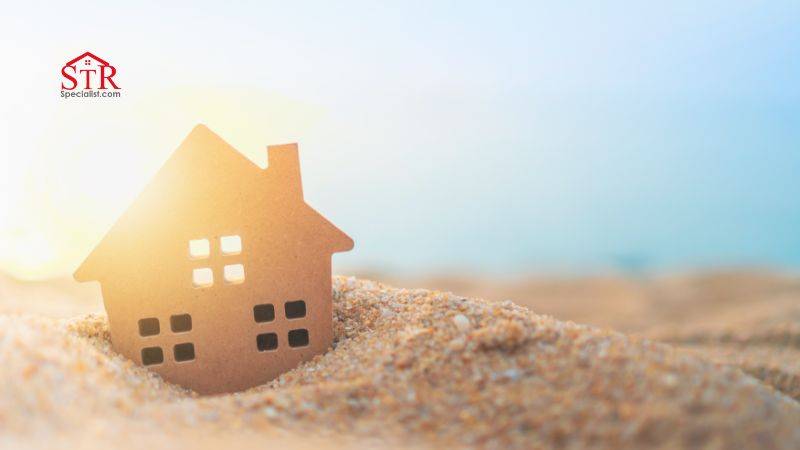
Contemplating the idea of listing your tiny homes on Airbnb? You’re in good company. With their eco-friendly and cost-effective features, tiny homes are increasingly attracting a diverse range of travelers. Consequently, many people are leveraging the short-term rental (STR) market by featuring their compact properties on platforms such as Airbnb, VRBO, and Booking.com. This article is designed to assist you in launching your Airbnb journey with helpful tips on managing your small-scale short-term rental. If you’re on the hunt for inspiration for your tiny house venture, this blog also showcases some unique tiny homes currently available on top vacation rental sites. Mastering the Art of Tiny Home Hosting on Airbnb With tiny homes becoming an increasingly popular travel choice, they offer an ideal rental option for those seeking an affordable, yet unique and cozy lodging experience. Despite their smaller size, these properties exude a special charm and stylish ambiance. The rising demand coupled with lower initial expenses makes Airbnb’s tiny homes a potentially profitable venture for hosts. Enhancing your property’s aesthetic appeal and furnishing it with all essential amenities for a comfortable stay can significantly increase your chances of a profitable operation. Above all, outstanding customer service is key to ensuring guest satisfaction. While managing an Airbnb property can be demanding, vacation rental software such as Hospitable can streamline your tasks, freeing up your time to concentrate on crafting unforgettable experiences for your guests. Garnering positive reviews from these experiences can lead to a higher booking rate, further fueling your success. However, before you dive headfirst into the realm of Airbnb hosting, it’s crucial to ensure that short-term rental of your tiny home is lawful in your locality. Reach out to your local governmental bodies to ascertain if there are specific building codes or zoning rules that you need to adhere to. Preparing Your Tiny Home for an Impeccable Guest Experience Before initiating your listing on Airbnb, it’s essential to gear up your tiny house to receive guests. Here are some fundamental elements you should incorporate to ensure your tiny home Airbnb is guest-ready: Cozy sleeping facilities A comfortable living area furnished with a sofa or chairs and a dining table A clean, operational bathroom equipped with basic amenities such as hand and body soap and towels Outdoor facilities like a fire pit Transitioning your tiny home into an Airbnb involves more than meets the eye. Part of the formula for success is furnishing your guests with all they need to feel at home. We’ve compiled a standard host checklist in a blog post that you might find useful. It enumerates all the items you should stock in your tiny home to assure your guests of an enjoyable travel experience. Listing Your Tiny Home on Airbnb Once your tiny home is ready for guests, it’s time to register and put up your rental space on Airbnb. With the rise of the tiny house movement, more such homes are appearing on Airbnb and similar platforms. It’s crucial, therefore, to make your tiny home stand out to catch the attention of prospective guests: Incorporate numerous captivating photos in your listing to emphasize your tiny house’s best features and set expectations for your potential guests. Craft an appealing title and a precise listing description to convey a clear image of your space, underlining its unique attractions. Include information about the local area to inform guests about potential explorations. Incorporate terms like “tiny home” and “tiny house”, along with other relevant keywords, to ensure your listing appears in the appropriate Airbnb categories. Set a competitive rate per night for your tiny home. Investigate similar listings in your vicinity to gauge what other hosts charge and adjust your price accordingly. Remember to consider all variables that may influence the price, such as your tiny house’s size, the amenities provided, your property’s location, seasonality, nearby attractions, and so forth. Enlist a Trustworthy Cleaning Service Maintaining cleanliness is of utmost importance to travelers, meaning your rental space must always be pristine and inviting. Cleaning a tiny house can pose unique challenges, especially with areas like loft beds or other hard-to-reach corners. To overcome these obstacles, consider hiring professional cleaning services or investing in professional-grade cleaning tools, such as a steam-cleaner, to simplify the cleaning process. Cultivate Your Skills as an Approachable and Prompt Airbnb Host Effective communication significantly shapes the guest experience, and guests often reflect this in their reviews. Strive to address all booking inquiries swiftly and maintain proactive dialogue with guests before, during, and after their stay. By doing so, you can ensure that travelers have all the necessary information promptly when needed. In Conclusion With a growing demand for compact living spaces and reduced costs, leasing tiny homes on Airbnb can serve as a lucrative avenue for earning rental income. However, it’s crucial to remember that turning your tiny home rental into a profitable venture requires thoughtful research, meticulous preparation, and time. The cornerstone to your success lies in ensuring your guests have an outstanding experience during their stay at your tiny home. You may also like Guide to Selecting the Ideal Cookware Sets for Your Airbnb Kitchen Airbnb and Its Background Check Procedures: What Hosts Should Know
Six Unique Bed Setups for Your Airbnb Space
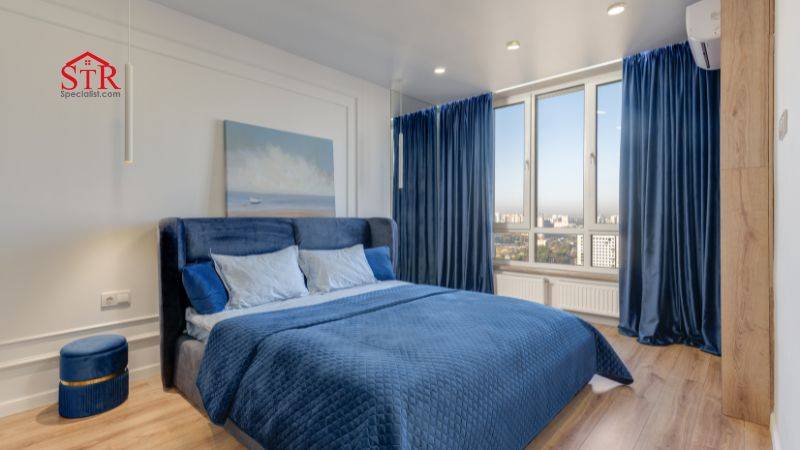
The tradition of expecting a private bedroom in a rental property is fast evolving. Nowadays, an increasing number of accommodations are promoting communal living or sleeping arrangements. And there’s a good reason for this shift – sleeping on a sofa, for instance, can be just as comfortable, if not more so, than a bed, and it’s certainly more cost-effective. So, if you’re contemplating listing your extra space on Airbnb, why not consider unconventional sleeping setups? This approach could enhance your booking potential and likely boost your income. Let’s delve into innovative ideas you could embrace when designing sleep spaces in your Airbnb. 1. Bunk Beds Bunk beds serve as an excellent choice for accommodating multiple guests and optimizing room space. When selecting these, ensure you go for robust designs with guardrails to prevent guests from falling from the top bunk. Should your target market be families, incorporating bunk beds or even multiple bunk beds can accommodate more guests, potentially increasing your booking rate due to the added bed spaces. Standard bedrooms can easily accommodate Twin Beds. When dealing with limited space, bunk beds become the ideal option. These are also an excellent addition if you intend to host families with children. Unfortunately, no products were found. On the other hand, Queen Bunk Beds require a larger space. If you’re dealing with a spacious room, queen bunk beds could offer more comfortable sleeping arrangements for your guests, particularly adults. 2. Tent House Setting up air mattresses inside tents in your backyard is an inventive approach to sleep arrangements. This could be an exciting choice for both kids and adults. Remember, though, that for children, parental permission is necessary and securing the area from wildlife and other outdoor threats is crucial. In addition, supplying lights and other useful accessories such as portable lanterns is recommended for the convenience of your guests. Providing sleeping bags and other essential items that guests can bring into the tents would contribute to a good night’s sleep. Dome Tents are a popular choice available in the market. Although they traditionally have a small porch area, recent designs have enhanced their space. Dome tents come in various sizes, but it’s generally advised to accommodate a maximum of 4 guests for ease of setup and to minimize purchase costs. Unfortunately, no products were found. Tunnel Tents are ideal for larger families or groups, offering ample headroom and living space. They also tend to be more resilient to inclement weather than dome tents. Unfortunately, no products were found. Cabin Tents are typically designed with waterproof polyester, a canvas rainfly, and nylon top covers. Constructed with interconnecting aluminum poles, they offer a cabin-like atmosphere. These tents usually feature divided rooms, allowing you to segment parties into smaller groups, or designate one area for gear storage and the other for sleeping quarters. 3. Air Mattress Offering an air mattress that simply rests on the floor is a clever solution for accommodating extra guests. It’s swift and straightforward to set up and offers additional sleeping space. The mattress can be deflated and easily stored away during the day, keeping your space uncluttered. A Raised Air Mattress, which is usually over 10 inches thick, can provide superior support for sleepers. This could be a preferable option for older guests as it’s elevated enough to resemble a regular mattress. Self-inflating mattresses, which inflate and deflate at the push of a button, don’t require manual pumping. These mattresses are equipped with internal pumps, making them easy to set up, albeit at a higher price point. 4. Murphy Beds Twin Murphy beds make for an engaging and inventive sleep solution. Opt for horizontal variants that slide into the wall instead of the traditional style. When unfolded, they resemble bunk beds, yet they can be neatly tucked away when not needed. Although Murphy beds often get a bad rap for their subpar mattresses, you can enhance your guests’ comfort with high-quality options that also free up space when stowed. A Chest Cabinet Bed features a foldable mattress that is stored in a cabinet or cupboard, providing a departure from the traditional Murphy bed that stows a whole mattress into the wall. These beds are compact, taking up less room and blending seamlessly into your home’s furnishings. Horizontal Murphy beds function much like their vertical counterparts, but they are mounted sideways on the wall. These are ideal for smaller rooms and provide easier access. 5. Sleeper Sofas Spacious master bedrooms provide ample room to accommodate a sleeper sofa, which can effectively replace a reading table or an armchair. Your sleeper sofa should be comfortable enough to host an adult, but it can also serve as a bed for children traveling with their parents. Depending on the size of the sleeper sofas, you might consider placing them throughout your Airbnb property to facilitate larger groups. Sofa Beds are designed as transformable piece of furniture that can be folded down into a bed without the need to remove cushions or add an extra mattress. This type of bed is practical and helps save space. Pull-Out Couches, on the other hand, contain a full mattress within. The bed is revealed by flipping a handle. However, it’s worth noting that they tend to occupy more space than other options available in the market. 6. Chair Beds Embodying the same principles as sofa beds, chair beds present a versatile solution that can blend seamlessly with the interior decor of your Airbnb. Plus, their portability makes it easy to move them around the living room, and multiple chair beds can be used as needed. An Armchair Bed, designed for individual use, offers supreme comfort and relaxation. It includes an extendable footrest, which taller guests are sure to appreciate. The convenience of lounging while watching TV may be the perfect fit for certain guests. Furthermore, when in the ottoman position, it can blend inconspicuously with other furnishings, offering additional functionality. In Conclusion Airbnb hosts regularly detail their sleeping options, and guests appreciate the flexibility of sharing a bed or having
Mastering Airbnb Co-Hosting: An Introductory Guide
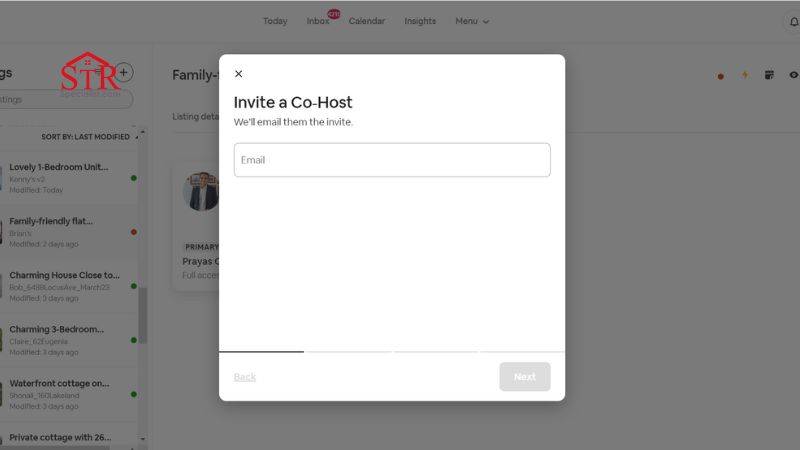
Managing an Airbnb property can be a demanding task, and given the fast-paced nature of our modern world, it’s understandable if hosts find themselves short on time. At times, as a host, you might require assistance, and this is where an Airbnb co-host becomes valuable. Airbnb co-hosts are individuals who aid the property owners in maintaining their listings and tending to the guests. They could be anyone – a relative, a nearby resident, a dependable friend, or someone specifically employed by the host to assist with the property management. Their role significantly contributes to easing the responsibilities of the host. Steps to Include a Co-Host on Airbnb Incorporating co-hosts is a convenient method to distribute hosting responsibilities, allowing them to manage various aspects of your listing from their personal account. With Airbnb’s 2023 Summer Release, you can directly control which co-hosts can access your listing and share your booking payouts from the platform. The Co-Host tab is your control center, where you can invite new co-hosts, access their information, and handle their permissions and payouts. Remember, co-hosts need to have an Airbnb account to accept your invite. To invite a co-host, input their email address and designate their permissions. You can select from several options: Full access – Empowers them to manage your calendar, listing, other co-host permissions, communicate with guests, and view payout and transaction history. Calendar and inbox access – Allows them to manage your calendar and correspond with guests. Calendar access – Grants them permission to view your calendar and receive check-in and check-out details. After deciding the level of access for your co-host, you can add a personalized message to your invite and then hit Send.All your co-hosts, except those with only calendar access, will appear as co-hosts on your listing. Moreover, co-hosts with full access can set themselves as the primary host on the listing, or you can designate them for this role. To make hosting even more effortless, Airbnb enables you to add multiple co-hosts to each listing. Alternatively, using vacation rental software like Hospitable.com allows you to assemble a team to share the workload, all working collaboratively on a singular platform. The division of duties and earnings between you and your co-host is entirely at your discretion. You have the flexibility to distribute payouts with a co-host as a proportion of your income or as a fixed amount per booking. Additionally, you’ll need to agree on a method for compensating the co-host for any expenses they incur. After establishing a payout arrangement for a co-host on Airbnb, they have a 14-day window to confirm it. Once confirmed, they can start receiving payouts for bookings post-guest check-ins. In order to receive payment, all co-hosts are required to set up at least one payout method. If necessary, they must also verify their identity and provide requisite taxpayer information. Steps to Initiate Your Journey as an Airbnb Co-Host Interested in venturing into the short-term rental business but don’t own a property? Two popular strategies include rental arbitrage and becoming an Airbnb co-host. As a co-host, your responsibilities would be extensive, encompassing guest communication, listing management across multiple platforms, and overseeing your cleaning and maintenance staff. So, how does one embark on the journey to becoming an Airbnb co-host? There are essential steps to follow. Firstly, thoroughly research the platform to understand its operations. You’ll have to familiarize yourself with several aspects such as managing listings, communicating with guests, updating calendar and pricing, liaising with Airbnb support, and even promoting your listings. To kickstart your learning, our guide for aspiring hosts is a fantastic resource, full of tips to help you become a successful host. Next, compile a resume that highlights your relevant knowledge and skills in managing short-term rental properties on Airbnb. If you have prior hosting experience, ensure to include the URL of the listing you managed along with a detailed explanation of your responsibilities. Once hired, the Airbnb account owner will add you as a co-host. The process of how to add a co-host on Airbnb has been detailed above. You’ll receive an invitation via email, and upon acceptance, you will officially become an Airbnb co-host. Consequently, you will be able to manage the listing from your personal Airbnb co-host account. Terms and Conditions for an Airbnb Co-Host While Airbnb necessitates that co-hosts adhere to their Terms of Service policy, hosts and co-hosts can also formulate their own customized agreement. It’s crucial to clearly articulate all terms and expectations within this document. Both parties need to ascertain hosting responsibilities, ensuring clarity regarding who is tasked with what, establish the co-hosts’ remuneration, and decide upon the reimbursement methodology for the co-hosts. You have the option to utilize or modify a pre-existing Airbnb co-host agreement, which you can typically locate on hosting forums. Alternatively, you may wish to engage a legal professional to draft an agreement that best suits your requirements. Cost Structure for an Airbnb Co-Host Wondering about the earnings of an Airbnb co-host? The truth is, there isn’t a standardized fee. The compensation for Airbnb co-hosts can greatly vary, depending on their duties, the property’s size, and its geographical location. On average, Airbnb co-hosts charge a fee between 10-20% of the nightly rate, excluding cleaning of the rental property. For instance, if you co-host an Airbnb that generates an annual income of $30,000, you could anticipate earning around $3,000-$6,000. However, if your tasks encompass everything from guest check-in and check-out to managing guest experience and property cleaning, you could charge a fee as high as 25%. Some co-hosts may negotiate a fixed monthly fee, mutually agreed upon by both parties. Additionally, co-hosts who clean the property after each guest may charge an extra cleaning fee. Ultimately, it’s in your hands to establish an Airbnb co-host agreement with the primary host at a fair rate. The scope of your duties as a co-host will significantly influence your potential income. Simply put, the more responsibilities you take on, the higher your earnings. Duties of an Airbnb Co-Host Wondering
Airbnb’s Quick Replies: A User’s Guide to Saving Time
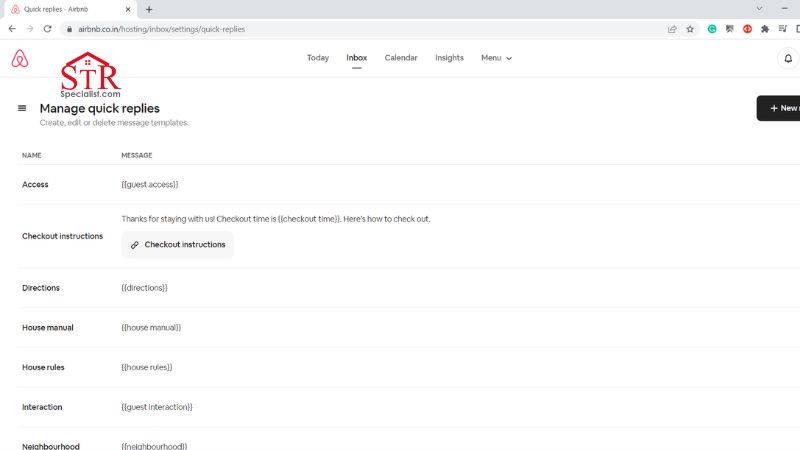
The reliability and efficiency of an Airbnb host is greatly influenced by their response time and rate. Maintaining high scores requires prompt replies to every guest’s query or request, which can become repetitive and less efficient when you’re frequently answering the same questions. Typically, Airbnb hosts are asked recurring questions like, “What is the Wi-Fi password?”, “Where is parking available?”, or “How can I find your place?”. Thankfully, the solution to this repetitiveness lies in Airbnb’s Quick Replies feature. This tool significantly reduces time spent on recurring inquiries, thus improving efficiency. Understanding the Quick Reply Feature on Airbnb Airbnb’s Quick Replies feature empowers hosts to use templates for responding to common inquiries. An effective messaging strategy using these templates enhances your guests’ experience, particularly for those visiting for the first time. Despite this, establishing effective communication with guests has long been a challenge for many hosts. Thankfully, the Quick Replies feature offers a practical solution to this issue. The Advantages of Using Airbnb’s Quick Reply Feature With the rollout of Airbnb’s Quick Reply feature, hosts have experienced these notable advantages: 1. Enhances Clear and Efficient Communication Sally, a host from Snoqualmie, Washington, testifies that the quick reply templates have streamlined her communication process. She recounts an instance where she was able to respond to four guest inquiries in under 10 minutes using these templates. The Quick Reply feature lets you prepare precise, suitable, and well-edited responses beforehand. This prevents the risk of delivering vague or inappropriate responses to your guests, particularly when you’re pressed for time and dealing with multiple requests or inquiries simultaneously. 2. An Ideal Tool for Enhancing Your Response Time and Rate Your response time and rate, which indicate how promptly you address inquiries, reservation requests, and other guest queries, are crucial metrics in Airbnb hosting. Airbnb typically tracks and displays these statistics on the hosts’ dashboard. For those utilizing professional hosting tools, this information can be found under the “requests” section. The Quick Reply feature is a perfect tool for improving these crucial metrics. Maintaining stellar response rates significantly influences your likelihood of attaining or preserving the prestigious Superhost status. One effective strategy to keep your response time and rates optimal is leveraging the Airbnb Quick Reply feature. As you effectively address your guests’ concerns, their satisfaction increases, thereby boosting your odds of retaining the Superhost status. Through the Quick Reply feature, you’re enabled to generate templates that facilitate: 1. Prompt acceptance or rejection of reservation requests from guests 2. Swift responses to new inquiries 3. Accessible for Use by Additional Team Members In case you’re hosting with a team, members who have guest management permissions are also able to use the Quick Reply templates that you’ve created to respond to guests. These saved messages can be accessed via the team’s shared inbox. Setting Up Quick Replies on Airbnb Follow the steps below to utilize Airbnb’s Quick Replies feature: Navigate to your hosting inbox. Click on the folder menu, select “quick replies,” and choose “+New Reply.” Input a name for your template for identification purposes. Rest assured, this will not be visible to the guests. Craft your message, then add shortcodes for seamless message personalization, such as names and other guest-related information. Choose a language that corresponds with the one you used in crafting your message. This is important as it influences how Airbnb will interpret the shortcodes. Save your crafted template. Navigating to Airbnb’s Quick Replies Templates Once you’ve created various templates and saved them, they can be accessed as follows: Navigate to your hosting inbox, select a conversation with your guest, choose a fitting reply, and click on “use this reply” to input the content into the message box. At this stage, you can also make any necessary adjustments to your quick replies. Modifying Airbnb Quick Replies: Is It Possible? Indeed, it is. Navigate to your hosting inbox. Access the folder menu. Choose quick replies. Modify the message of your choice. Save your updated message. As you continue using the quick reply feature, you might find it necessary to revise or refresh your quick reply messages. Understanding Shortcodes in Airbnb’s Quick Replies In the context of Airbnb’s Quick Reply feature, shortcodes are crucial for auto-filling guests’ listing details and reservations. If the required listing information isn’t provided, the shortcode will appear as unavailable. Some frequently used quick reply shortcodes include: Guest’s name Dates of check-in and check-out Cleaning charge Wi-Fi access details Booking confirmation code Location of the listing Average cost per night Guidance to the property Information about the home Details of the main host Facilities and amenities available Sample Airbnb Quick Reply Message Upon confirming a guest’s booking, you’ll need to send an acknowledgment message. This initial interaction is crucial for setting a positive tone, so it’s important to get it right. Below is a sample Quick Reply message for this situation: Hello (Guest’s Name), Thank you for choosing to stay with us! I’m thrilled to host you at (Your Facility’s Name) starting from (Input Date). I’ll forward all the necessary check-in details, including directions, the lockbox key code, and the Wi-Fi password, on the day before your scheduled check-in date. Should you have any more questions, please don’t hesitate to reach out. I’m here to assist with any further information you might require for your stay. Best Regards, (Your Name) Is It Possible to Create and Utilize the Quick Reply Feature via My Smartphone? Indeed, the Quick Reply feature is fully functional on mobile devices. You can access it by launching the Airbnb app and selecting your inbox. From there, navigate to the inbox menu located at the top and opt for Quick Replies. The app will then steer you through the necessary steps. The Crucial Insight Assuming the role of an Airbnb host brings with it a plethora of responsibilities, thus any supportive tools can be a game-changer. To aid in crafting polished, pre-checked, and impactful responses, Airbnb offers the Quick Reply feature. This tool can assist hosts in
The Rewards and Hurdles of Operating an Airbnb
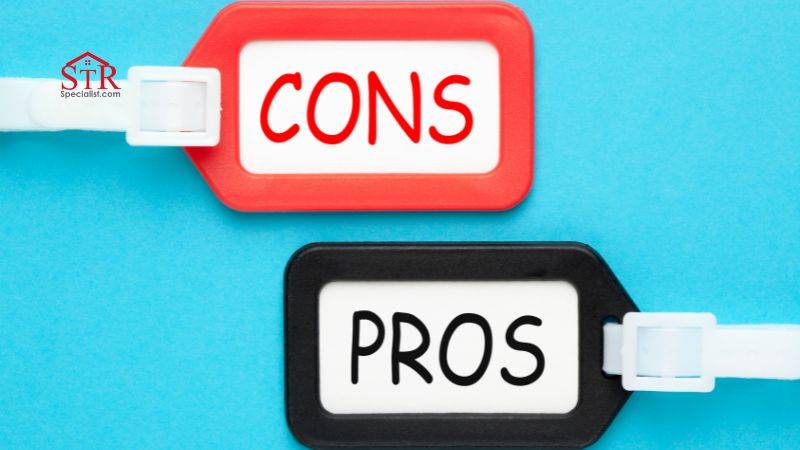
Considering purchasing a vacation property to list on Airbnb? The escalating demand for short-term rentals and the prevalent popularity of this online marketplace make the Airbnb approach an enticing prospect with potentially rewarding financial outcomes. However, such an investment should not be taken lightly as it does come with its set of obstacles. It’s thus crucial to thoroughly consider all the advantages and disadvantages associated with owning an Airbnb property before diving in. To aid you in deciding whether to become an Airbnb host, we will delve into the rewards and hurdles tied to short-term Airbnb home rentals. Exploring the Upsides and Downsides of Airbnb Ownership Airbnb, an online marketplace connecting property owners with travelers seeking accommodations, provides a convenient platform for hosts to generate additional income by renting out their homes or spare rooms. With Airbnb handling bookings, payments, and guest communication, it offers a hassle-free way for hosts to earn passive income from short-term rentals. Hosts have the flexibility to determine their level of involvement, from managing the listing themselves to hiring property managers or co-hosts to handle the responsibilities. Alternatively, vacation rental software such as Hospitable offers comprehensive features to assist hosts in managing essential tasks and automating daily operations. By leveraging these tools, hosts can streamline their short-term rental business, allowing for a more hands-off approach and enabling the property to run smoothly on autopilot. Before venturing into the realm of Airbnb hosting, it is imperative to carefully consider the benefits and obstacles associated with this business model, aligning them with your personal goals and lifestyle. By gaining a comprehensive understanding of both the advantages and challenges inherent in the Airbnb hosting experience, you can make a well-informed decision regarding the suitability of investing in an Airbnb property. Furthermore, this knowledge will empower you to acquire the necessary expertise and skills required to effectively manage a thriving short-term rental enterprise. Advantages Increased Income Potential: Owning an Airbnb property can provide higher income compared to traditional long-term rentals. By charging nightly rates and adjusting prices based on demand, you can capitalize on peak seasons, weekends, local events, and holidays. Diversified Guest Portfolio: With Airbnb, you can host multiple guests each month, reducing the dependency on a single long-term tenant. This diversification helps mitigate risks, such as late rent payments or cancellations, as the impact on overall income is minimized. Flexibility and Control: Airbnb offers flexibility as you can rent your property at your convenience and have control over guest selection and stay duration. You can block off dates for personal use or adjust rates regularly to maximize profitability. Effective Marketing Platform: Airbnb provides a built-in marketing platform, attracting millions of travelers actively seeking accommodations. Utilizing this platform allows you to leverage its traffic and start building your vacation rental business while focusing on enhancing the guest experience. Strategic Marketing Opportunities: To succeed in the short-term rental market, implementing a comprehensive Airbnb marketing strategy is crucial. By utilizing both online and offline channels, you can effectively promote your listing, increase occupancy rates, and establish your brand. Creating a direct booking website, such as through Hospitable, enables you to build your brand, nurture guest relationships, and drive repeat bookings with user-friendly, customizable templates requiring no technical expertise. Challenges Before reaching a final decision, it is crucial to thoroughly consider the common challenges associated with owning an Airbnb property. 1. Navigating Airbnb Rental Restrictions Various cities have distinct regulations governing Airbnb rentals, and certain jurisdictions impose stringent rules regarding short-term stays. Therefore, it is essential to conduct thorough research to determine the legality of hosting in your specific area and identify any specific requirements you must adhere to. Many cities implement restrictions on Airbnb rentals to preserve housing availability for local residents. If you choose to operate an Airbnb in a more restrictive city, it can potentially limit your income opportunities. In such cases, it may be more beneficial to consider long-term renting options or explore alternative cities with more lenient Airbnb regulations. To gain further insights into Airbnb regulations in popular US locations, you may find our blog article a valuable resource. 2. Increased Financial Obligations Owning an Airbnb property entails higher expenses compared to traditional renting. As a host, you will bear the responsibility of covering initial costs, including repairs and improvements, to enhance the appeal of your rental property and increase its booking potential. Moreover, investing in high-quality furniture, decor, appliances, and popular amenities is essential to provide a comfortable and enticing stay for your guests. Additionally, Airbnb hosts are responsible for covering ongoing expenses such as electricity, water, cable TV, WiFi, and cleaning services, as well as conducting regular property maintenance and necessary repairs. 3. Time and Effort for Success Achieving success as an Airbnb host requires patience and dedication. While having a perfect property in a sought-after tourist destination is advantageous, it doesn’t guarantee bookings every night right from the start. Building a solid reputation as a host is crucial in attracting guests. To accomplish this, you must strive to provide exceptional experiences that earn 5-star reviews and enhance your overall rating. By consistently delivering memorable stays, you increase the likelihood of attracting new guests and securing more bookings over time. Remember that cultivating a stellar reputation as a host takes effort, but the rewards are worth it in the long run. 4. Thriving in a Competitive Short-Term Rental Market Entering the Airbnb business requires more than just securing a property in an ideal location and listing it on the platform. To succeed, you must exert effort to connect with your target audience and differentiate your listing from competitors. Dedicating time and allocating additional resources is essential to exceed guest expectations and cultivate positive reviews. This entails investing in high-quality bedding and bath accessories, capturing professional photos of your property, and providing thoughtful amenities like welcome gift baskets. Hosting on Airbnb often demands significant time and energy, resembling a full-time job. To alleviate the workload, many hosts turn to vacation rental software like Hospitable, which offers automation
Guide to Selecting the Ideal Cookware Sets for Your Airbnb Kitchen

Granting access to your room or the entire property to unknown guests differs significantly from hosting your close friends for a weekend. It is crucial to equip your Airbnb kitchen with all the necessary cookware, facilitating a convenient and stress-free stay for your guests. This allows them to focus purely on enjoying themselves and exploring the unique attractions of your locality. Considerations When Buying Cookware Sets In case you’re working with a restricted budget, don’t feel compelled to overspend. Affordable, top-notch cookware sets can easily be found online. What’s crucial is that you keep an eye out for the following features in your prospective cookware: 1. Having nonstick coatings is an essential feature for cookware. Fortunately, many contemporary pots and pans are coated with PTFE, which makes them easy to clean and extends their durability. Regularly inspect your pans for any signs of chipping or flaking to ensure maximum safety for your guests. 2. Lids made from Tempered and Vented Glass: These lids, designed with a steam vent, let you monitor your food as it cooks, while simultaneously releasing steam. This ensures each dish maintains the right moisture balance. 3. Uniform Heat Distribution: This is vital to avoid scenarios where food is overcooked on one side and undercooked on the other. Proper heat distribution ensures evenly cooked meals. Top Cookware Sets for Your Airbnb Kitchen With the aforementioned features in mind, we have compiled a list of cookware sets that would perfectly complement your Airbnb kitchen. It’s important to align your purchase with your budget, hence we’ve categorized the cookware sets into budget-friendly, mid-range, and premium segments. Affordable Cookware Sets The Calphalon 10-Piece Pots and Pans Set is a prime choice for any kitchen, delivering nonstick convenience and superior durability. The set features Stay-Cool Stainless Steel Handles for safe handling during cooking. With its sleek black aesthetic, this cookware set not only enhances your cooking experience but also adds a stylish touch to your kitchen decor. Amazon Basics Stainless Steel 15-Piece Cookware Set The Amazon Basics Stainless Steel 15-Piece Cookware Set provides a comprehensive kitchen solution with its variety of pots, pans, and utensils. Crafted with durable stainless steel, this set is built to withstand the rigors of daily cooking. It’s an excellent starter kit or upgrade for any kitchen, offering versatility and longevity to your culinary adventures.Mid-Range Cookware Sets SENSARTE Nonstick Cookware Set (8-Piece) The SENSARTE Nonstick Cookware Set is an 3-piece collection that stands out with its healthy granite design and nonstick coating. Its Stay-Cool handles and compatibility with induction cooktops add to its appeal. This set prioritizes health while offering superior nonstick performance, making it an ideal choice for a safe and efficient cooking experience. Granitestone Red Pots and Pans Set The Granitestone Red Pots and Pans Set, featuring a stunning 20-piece collection of cookware and bakeware, boasts a unique mineral and diamond coating for exceptional nonstick performance. This long-lasting, ultra-durable set is oven-safe and dishwasher-friendly, ensuring easy cleanup post-cooking. It’s 100% toxin-free, making it not just a visually appealing choice with its vibrant red finish, but also a safe and health-conscious addition to your kitchen. High-End Cookware Sets GreenPan Valencia Pro Hard Anodized Healthy Ceramic Nonstick pots and pans The GreenPan Valencia Pro is an 11-piece cookware set made of hard-anodized materials, featuring a healthy ceramic nonstick surface. Its gray color gives it a professional and sleek look. The set is free from PFAS, safe for induction stovetops, dishwasher-safe for easy cleanup, and oven-safe for versatility. It’s an ideal blend of aesthetics, safety, and functionality, elevating your cooking experience to the next level. Granite Cookware Sets Nonstick Pots and Pans Set Nonstick – 23pc Kitchen Cookware Sets The Granite Cookware Sets Nonstick Pots and Pans Set is a comprehensive 23-piece collection designed for both functionality and style. This set features induction-compatible cookware that makes it suitable for various cooking methods. Its non-sticking quality promises easy cleaning and maintenance. This generous set ensures you have the right tool for every culinary task, making your cooking experience seamless and enjoyable. Final Words Providing a welcoming kitchen and a seamless cooking experience at your Airbnb could be exactly what your extended-stay guests are looking for. Simple enhancements, like incorporating a high-quality cookware set into your Airbnb kitchen, could significantly improve guest satisfaction and your hosting experience. You may also like: The Best Smart Home Devices for Your Airbnb Property Airbnb Shopping List – Kitchen Essentials
New 2023 Features for Airbnb Hosts: A Brief Overview
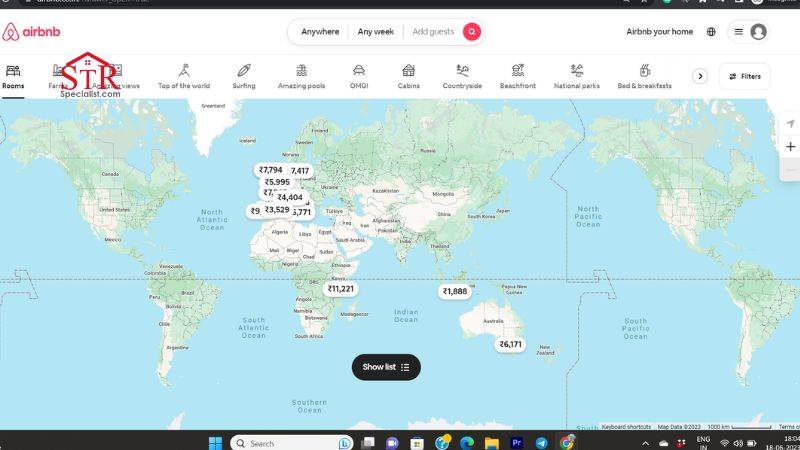
Understanding the latest developments and trends on Airbnb is a crucial aspect of being a successful short-term rental host. It’s key to staying competitive and optimizing your earnings. Airbnb has introduced a variety of new features aimed at simplifying the hosting process, increasing profitability, and enhancing guest satisfaction. In this article, we’ll delve into the fresh Airbnb additions that can enhance your bookings, income, and guest experience for the year 2023. 1. Leverage Quick Replies for Efficient Interaction with Your Airbnb Guests One of the most substantial hurdles in short-term rental hosting is managing effective communication with guests. Quick, considerate responses are key to improving guest experience and garnering positive reviews. Airbnb’s enhancement of the Quick Replies feature allows you to respond immediately to checkout-related queries via the messaging app. Not only does this save you precious time, but it also ensures guests receive speedy and accurate responses. While this feature was already used for generic check-in and check-out messages, this new update allows hosts to address checkout needs more promptly. It also nudges you to set up these messages if you haven’t done so already. 2. Facilitate a Seamless Departure Experience with Airbnb’s Checkout Tools Airbnb’s enhanced Checkout Features streamline the departure process for both hosts and guests. Now, hosts can designate checkout tasks for guests simply by selecting the necessary chores. On their end, guests receive a notification on the day of departure detailing the required tasks. This innovative feature allows guests to easily track their progress, making the process more user-friendly and efficient. Consequently, your guests can comprehend your expectations and guarantee that the space is left tidy, facilitating the cleaning process. 3. Optimize Team Management with Airbnb’s Advanced Co-Host Tools The co-hosting feature of Airbnb is a fundamental component for fostering effective team collaboration. The newly introduced Co-Host Tools update significantly simplifies the management of co-hosts. These innovative tools enable you to view all co-hosts in a single location, send out straightforward invitations, and assign varying levels of access based on each co-host’s role. An added advantage is that Airbnb can now directly remunerate co-hosts, depending on the host-set percentage or rate for the co-host’s services, thus eliminating the need for host-to-co-host payments. 4. Maximize Your Rates and Availability Utilizing Airbnb’s Calendar Modifications The Airbnb calendar has been significantly enhanced, bringing about a host of advantages for short-term rental hosts. You can now opt for a year-long calendar view to conveniently plan your availability and pricing for the whole year. The new feature also enables you to set up discounts for specific time blocks. Airbnb goes a step further by providing suggestions based on the offerings of other hosts in your vicinity. Now, instead of having to select individual dates in the mobile app, you can modify several weeks simultaneously, a much-awaited update set to save hosts time and effort! Moreover, Airbnb now provides rate suggestions based on the charges set by other hosts who have successful bookings. Likewise, knowing the rates set by hosts who are struggling with bookings can help you formulate your pricing strategy more wisely. 5. Provide Your Guests with Additional Details through Airbnb Rooms Airbnb Rooms is an innovative feature enabling hosts to share more detailed information about the room for rent, who else is living in the house, and what the guest should anticipate. This allows guests to make more knowledgeable decisions about their rentals and establish a stronger connection with their hosts. If you’re not offering an entire home for rent but wish to monetize your available space, Airbnb Rooms can assist you in reaching out to those seeking a cozy and affordable accommodation option. Review our listing examples and start sharing your space for a fulfilling and profitable hosting journey. 6. Maintain a Competitive Edge with Early Access to Airbnb’s Features In a final noteworthy update, Airbnb now grants hosts early access to features still in the testing phase, allowing them to review and provide feedback prior to public release. This empowers you to stay on top of changes as they occur and harness the potential of new features and trends ahead of your competition. Advantages of Airbnb’s 2023 Updates for Short-Term Rental Hosts The newly introduced features by Airbnb offer a myriad of benefits for short-term rental hosts. You can now benefit from enhanced communication, improved team handling, optimized pricing and availability, seamless checkouts, and increased guest information. These updates significantly transform the hosting experience for those aiming to provide a safe, comfortable, and enjoyable stay for their guests. With over 50 new features, developed based on user feedback, Airbnb showcases its commitment to prioritizing the needs of hosts and guests. Indeed, mastering all these new features might require time! However, leveraging them effectively will undoubtedly enrich your hosting experience and create an improved stay for your guests. Do check out Airbnb’s comprehensive list of updates from the 2023 Summer Release for Hosts. How are you leveraging Airbnb’s latest updates? We’d love to hear your experiences in the comments section! You may also like: Crafting Your Airbnb Pre-Reservation Communication: Key Messages for Your Guests Stand Out in Vrbo: A Guide to Crafting a Top-Notch Listing
Establishing Protocols for Lengthy Stays
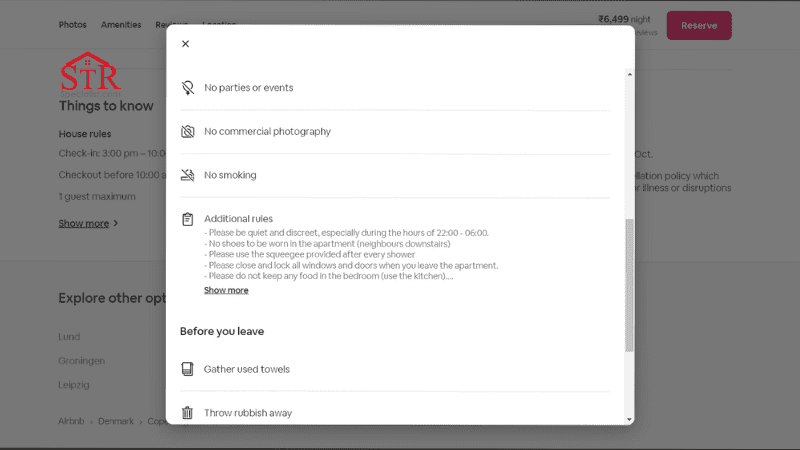
Setting ground rules is crucial whether you’re renting out your house as an Airbnb for short or long-term stays. These rules enhance your business’s efficiency, improve guest experiences, and safeguard your property. When it comes to extended stays, establishing clear guidelines becomes even more critical as long-term guests will be spending a significant amount of time on your premises. Ensure a positive and mutually beneficial experience by laying down comprehensive ground rules for extended stays. Essential Ground Rules for a Positive Stay Ground rules for extended stays serve as a professional means to clearly communicate expectations to guests, including permissible and prohibited actions, as well as the consequences for violating any established rules. These rules not only set the tone for your guests but also demonstrate how you prioritize hosting and safeguarding your property. Ideally, it is advisable to include your house rules as part of your listing, enabling potential guests to determine if your accommodation aligns with their preferences before making a booking. Establishing ground rules for extended stays requires careful strategizing to ensure their effectiveness. To assist you in this process, here is a straightforward guide outlining key factors to consider when setting up your ground rules: 1. Simplicity is Key: Crafting Clear and Understandable Ground Rules When establishing ground rules for extended stays, it is crucial to use straightforward language that is easily comprehensible, particularly for international guests who may be unfamiliar with certain terms. Avoid using jargon or complex terminology that may cause potential guests to skim over the rules, potentially resulting in misunderstandings or accidents. To provide more detailed information, consider leaving a House Manual at the property, covering additional rules, penalties, and other essential details that guests need to know. 2. Guest-Centric Ground Rules When formulating your Airbnb ground rules, it is crucial to consider the specific needs and preferences of the guests your house may attract. Take into account the following guest profiles: Traveling professionals Vacationing grandparents Families with children Young adults By aligning your ground rules with the anticipated guest demographics, you can ensure a more tailored and accommodating experience for your potential renters. 3. Enhancing Safety: Gentle Reminders for Airbnb Guests It’s important not to assume that your guests are always vigilant when it comes to safety and security. To ensure a secure environment, consider placing small reminders throughout your Airbnb. For instance, a simple laminated sign on the back sliding door saying, “Remember to lock the door,” can serve as an effective prompt. These gentle reminders help foster a safety-conscious mindset and contribute to a secure and worry-free stay for your guests. 4. Express Yourself: Let Your Unique Personality Radiate Your ground rules serve as a reflection of your hosting style and contribute to the overall ambiance of your Airbnb. If you possess a fun-loving and laid-back personality, don’t be afraid to showcase it in your rules. For instance, you can inject humor by playfully requesting guests not to “accidentally set the house ablaze” while enjoying a backyard BBQ. Adding a touch of your unique personality to the rules adds character and creates a memorable experience for your guests. Essential Elements for Your Airbnb Ground Rules Clear Parking Guidelines: Specify the availability and type of parking (e.g., street or oversized) and outline any penalties for parking violations, ensuring transparency for your guests. No Additional Guests: Explicitly state that only paying guests are allowed on the property to avoid unauthorized usage of your facilities and property. This helps minimize liability concerns associated with accommodating extra individuals. Restriction on Parties or Events: Make it clear that your Airbnb is not suitable for hosting weddings or large events. Emphasize that your rental is designed for regular accommodations, and guests should seek appropriate event venues for such occasions, allowing you to focus on providing a quality experience for your guests. No Smoking Policy: Clearly outline your smoking rules, indicating where smoking is allowed (if applicable) and providing guidance on the disposal of smoking-related trash. Alternatively, explicitly state “No Smoking” and establish a substantial cleaning fee to deter smoking occurrences. Remember to address electronic cigarettes and cannabis usage, considering their popularity and legal status in your area while acknowledging the potential cleaning challenges they pose. No Shoes Inside: Request that guests remove their shoes upon entering your property, either as a sign of respect or to preserve your flooring. Consider providing a designated basket or cubby for shoe storage to facilitate compliance with this rule. Pet Policy: Communicate your pet policy to guests, clarifying whether your property is pet-friendly. If pets are not allowed, establish a pet-related cleaning fee in case a guest violates this rule. Children & Infant Policy: Clearly communicate whether your home is suitable for children and infants. If your property is not kid or baby-friendly, include this information in your ground rules. No Flame Candles: Prohibit the use of open flame candles on your property, including birthday candles. Assure guests that they are welcome to use battery-operated, flame-free candles instead. If possible, provide these candles for their convenience and peace of mind. Additional Straightforward Rules to Consider: No Food or Beverages in Bedrooms: Request that guests refrain from eating or drinking in the bedrooms to prevent stains and maintain cleanliness. Turn off the AC: Remind guests to switch off the air conditioning when they leave the Airbnb to conserve energy and reduce unnecessary usage. Adhere to Check-In and Check-Out Times: Emphasize the importance of respecting designated check-in and check-out times to facilitate smooth transitions for both guests and hosts. Observe Local Quiet Hours: Inform guests about any specific quiet hours imposed by local regulations or community guidelines to ensure a peaceful environment for all. Responsibility for Keys: Emphasize the importance of not misplacing or losing the keys provided, as replacement costs and inconvenience may apply. No Furniture Rearrangement: Request that guests refrain from moving or rearranging the furniture to maintain the intended setup and prevent potential damage. Clean Up After Yourself: Encourage guests to wash their dishes and dispose of
Crafting Your Airbnb Pre-Reservation Communication: Key Messages for Your Guests

The Airbnb pre-reservation communication is an automated note that hosts can configure to appear when guests initiate a booking via the Instant Book function. This message offers the opportunity for hosts to greet their guests, present a brief introduction, and share pertinent details the guests should be aware of. Moreover, it’s a valuable opportunity to gather more information about your guests and the nature of their visit, while also managing their expectations. Since your guests will review this message prior to completing their payment, it’s crucial to keep it succinct and clear. Airbnb Pre-Reservation Communication: Essential Elements to Include An effective Airbnb pre-reservation communication can lay the groundwork for an excellent first impression, portraying you as a warm and approachable host. Maintaining a tone that’s courteous, affable, and professional is key. Express your gratitude to your guests for selecting your property, conveying your eagerness to welcome them to your Airbnb. You can also ask certain questions to get a better understanding of your guest and their specific needs. This knowledge can bolster your confidence as a host and allow you to tailor the experience to the individual guest’s preferences. To provide a clearer picture of how to craft this Airbnb communication, here’s an illustrative pre-booking message: Hello {Guest’s first name}, I’m delighted that you’ve decided to book {Property name}. My name is {Host’s name}, and I’ll be your host during your stay. To make your visit even more comfortable and personalized, I’d love to get to know you better. If you could spare a few moments to answer the following questions, I’d be grateful: What brings you on this trip? What is your expected arrival time for check-in? Do you have any allergies or dietary restrictions that I need to be aware of? Do you have a preference for amenities such as coffee, tea, or anything else? Feel free to reach out if you have any queries or if there’s anything specific that can make your stay unforgettable. Eagerly looking forward to welcoming you to my home. {Host’s name} The Airbnb pre-reservation communication is merely one among a multitude of messages you’ll need to draft for each reservation in order to correspond effectively with your guests. Consistent guest communication can prove to be time-consuming, especially when managing multiple rental properties. Thus, it is beneficial to establish a short-term rental (STR) communication strategy utilizing templates for crucial messages such as booking confirmation, welcome, check-in, check-out, and more. However, while pre-crafted templates can streamline guest interactions, you still have the task of sending them out for every new booking. Also, dispatching generic messages may not always leave the best impression, implying the need to manually customize each template to personalize your communication. This is where the convenience of automation comes into play. With the aid of vacation rental software like Hospitable.com, you can devise an automated messaging strategy to engage with guests at specific intervals throughout their booking and stay. Hospitable allows you to establish messaging rules based on specific triggers and utilize shortcodes that dynamically embed data into your messages, providing a more personalized touch. Hospitable.com also features integration with ChatGPT to assist in responding to less common inquiries. Employing artificial intelligence (AI) powered communication, Hospitable can automate up to 90% of dialogues, ensuring that your guests consistently receive relevant information when it’s most pertinent. This enables you to optimize your hosting operations, maintain outstanding communication throughout the guest’s entire journey, and deliver an unparalleled experience that leaves your guests satisfied. You may also like: 7 Methods to Prepare Your Airbnb for a Photoshoot Mastering the Art of Airbnb Design: 5 Key Tips to Entice Guests
Stand Out in Vrbo: A Guide to Crafting a Top-Notch Listing
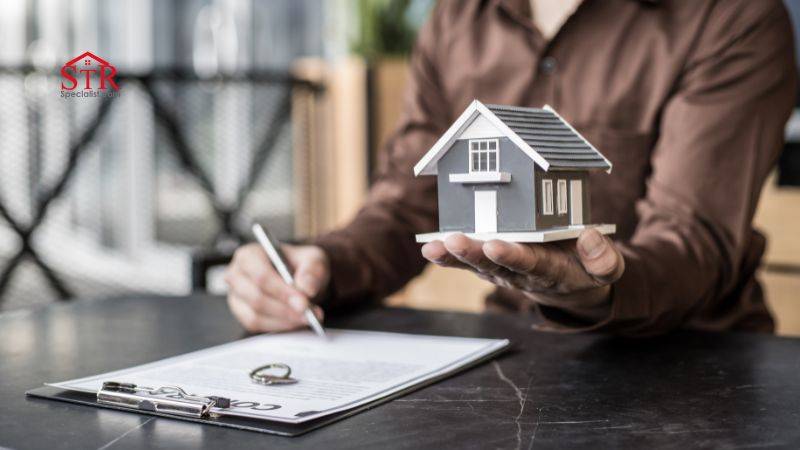
As a vacation rental owner, it’s crucial to maximize the exposure of your property to ensure consistent bookings. By adding your property to VRBO, you can significantly widen your global audience reach. VRBO, with its 2 million properties across 190 countries and a user base of 48 million, is one of the leading online travel agency platforms. However, you may wonder if simply listing on VRBO is enough to secure more bookings and increase your revenue. With the stiff competition from millions of listings on various booking sites, how can you ensure your property doesn’t get lost in the crowd? This guide offers a comprehensive walk-through on creating a VRBO listing, and also delves into tactics for optimizing your listing to improve its visibility in search results and draw in the right guests. Additionally, we suggest taking a look at our blog post which addresses common VRBO questions, to gain a more thorough understanding of how this vacation rental platform benefits property owners. Why You Should Consider Listing Your Property on VRBO VRBO, now part of the renowned Expedia Group, is a dependable and globally recognized online travel brand. When you list your vacation property on VRBO, you expose it to a large audience actively seeking vacation rentals. What’s more, your property listing will also feature across other Expedia Group platforms, such as HomeAway, Trivago, Expedia, and KAYAK, further broadening your visibility. A key strategy for bolstering your business’s success is to list your property across various platforms, including VRBO, Airbnb, and Booking.com. This approach allows you to reach a diverse and expansive audience. Furthermore, leveraging vacation rental software like Hospitable.com can streamline your management process. It enables you to efficiently oversee all your listings from one central dashboard, thus eliminating the need to navigate multiple calendars. Creating a VRBO Listing: A Detailed Guide Before embarking on the process of listing your vacation rental on VRBO, ensure you have the following information ready: The precise address of your property Fundamental details about your vacation property—including its size, type, and the number of bedrooms and bathrooms A minimum of six digital photographs showcasing your property Your banking and payment information Details of your rental charges, including the nightly rate, cleaning fees, and so on. The process of listing a vacation rental on VRBO is quite simple and can be completed in a matter of minutes. Begin by visiting the VRBO website and choosing ‘List Your Property’ located at the top of the homepage. You’ll need to input basic details about your property such as the number of bedrooms and bathrooms, and its location to get an estimate of its earning potential. Next, you will be required to set up an Owner account. This involves providing your first and last name, email address, phone number, and choosing a password. Once the account is created, VRBO will provide an estimate of your property’s earning potential based on properties in your area with a 75% occupancy rate. After receiving a confirmation email verifying your registration, you can proceed with the subsequent steps to finalize your rental listing. Location Verification: Confirm your property’s location by inputting your address and using the map feature to accurately pinpoint its exact location. Property Details: Fill in additional details about your property, such as the title, description, and amenities. Also, establish house rules, like maximum occupancy, minimum age for renters, as well as policies on parties, children, pets, and smoking. Local Laws: For certain locations, it may be necessary to visit a local law page to understand the regulatory obligations for your listing. Photographs: Upload between 6 to 24 pictures for your listing. Account Security: Authenticate your account by receiving a verification code on your mobile phone to validate your identity. Payment Details: Input your contact details and set up your banking and payment information. Pricing: Define your booking availability, per-night rate, minimum stay duration, and any extra charges. You can choose to add taxes separately or incorporate them into the price (make sure to comply with all local regulations and tax requirements). Booking Readiness: This is the final step. Review your booking settings and ensure everything is correct before proceeding. Going Live: Click on ‘Publish listing’. Vrbo will then review your submission and notify you once your property is live on their platform. Enhancing Your VRBO Listing: Helpful Optimization Strategies After publishing, a new VRBO listing may take anywhere between 24 and 48 hours to appear in search results. This window allows you time to fine-tune your policies and refine your dashboard. However, it’s also crucial to optimize your listing for increased visibility and to attract more potential guests. Here are some tips to do just that. Craft an engaging title:- The title is the first thing travelers see in search results. Make it unique, and use evocative words to accentuate your property’s most enticing features, prompting potential guests to click on your listing. Compose an appealing description:- Describe what sets your vacation home apart and makes it an exceptional place to stay. Concentrate on your property’s amenities and explain how they can enhance the guest experience. Aim to portray the unique experiences guests can anticipate. Showcase impressive photos:- Capture and upload high-quality images of every room and outdoor space to provide a comprehensive visual of your vacation home. Natural lighting works best, and don’t forget to highlight any unique features or attractive details of your rental. Including images of local attractions and the surrounding area can also be beneficial. Ensure prompt responses:- Timely replies to all inquiries from travelers can significantly boost your listing quality score. Quick responses not only keep potential guests interested in your property but also show your attentiveness as a host. Maintain excellent communication throughout the guest journey. This can enhance guest satisfaction during their stay, which in turn, can lead to positive reviews and repeat bookings. Vacation rental software like Hospitable can be instrumental in streamlining this process, as it facilitates effective guest communication and automates various hosting tasks, significantly reducing your workload. Aim for 5-star reviews:- Exceptional reviews from previous
7 Methods to Prepare Your Airbnb for a Photoshoot
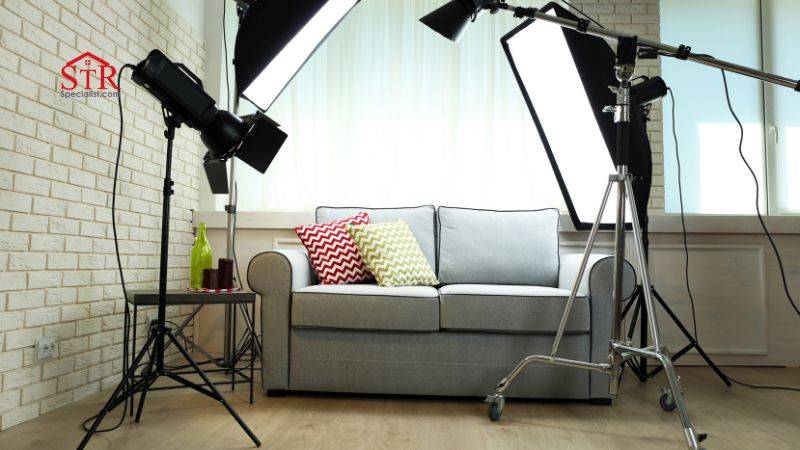
Attracting potential guests online is the initial move towards a prosperous booking. Amid a sea of competing listings, how can you ensure your property shines? Tailoring your home to suit diverse guest preferences and their specific requirements can seem daunting. However, by adhering to the steps detailed below, you can simplify the staging process tremendously. 1. De-cluttering Your Space The initial step towards making your home attractive to guests is maintaining cleanliness. It’s a given that your home should be clean, but when renting out to unfamiliar people, it’s necessary to elevate this standard. Overlooked details such as grout lines, bathtub stains, and randomly scattered cords on the living room floor might inadvertently be ignored while photographing the area. Ensure you have a variety of baskets, jars, or containers available to organize loose items like remote controls. Utilizing furniture-safe tape is an affordable solution to conceal unsightly cords from lamps and televisions. After organizing these loose items, it’s time to focus on the fine aspects of cleaning. Removing stains from porcelain, especially bathtubs, can be challenging. A practical solution is using clean, non-slip mats that not only improve cleanliness but also add to the décor. Remember to wash these mats after each guest’s stay. 2. Embellish the Area While embellishing the area, several factors need to be considered. This includes the size of your space, the average expected length of the bookings, and your property’s overall location. For instance, if your property is beachfront, your guests might be looking for a seaside escape. In such a case, infusing a tranquil coastal ambiance could be a charming touch. Conversely, if your property is a downtown loft, a décor featuring exposed brick and chrome may be more fitting. Regardless of your chosen decor, the space should exude safety, comfort, and warmth. While individual rooms may have unique features or themes, a sense of consistency should be maintained throughout the space. Conversely, undecorated areas can give off a stark, incomplete feeling. Your guests should sense a homely warmth when they step into your property, and this must be portrayed in your photos. Little homely touches like coordinating throw pillows, striking wall accents, and elegant hanging mirrors can significantly enhance the appeal of your listing. 3. Organize Your Furniture You might believe your furniture placement is functional, but how photogenic is it? For each room, position yourself at the point where you plan to take photographs, typically in a corner or entryway. From this perspective, does any furniture, like couches, obstruct windows or natural light? Does that coat rack you picked up at a garage sale obscure unique architectural features at the entrance? These are aspects to consider. If your prospective guest enjoys hosting gatherings, try emphasizing the spaciousness of the room. If there’s a couch acting as a central island, consider relocating it along a wall. This strategy not only creates more walkable space but also allows the camera to capture the entirety of the room. 4. Showcase Facilities In a conventional hotel room, amenities like coffee and toiletries are expected. Airbnb guests also look for these, but they might not be explicitly mentioned in the listing. A great way to demonstrate your commitment to guest comfort and convenience is by highlighting these amenities in your photographs. Include images of your coffee maker and a selection of light breakfast items in your kitchen scenes. Ensure your coffee maker is spotless and devoid of residual coffee grounds. A bowl or tray of fresh fruit can also add a delightful touch. Similarly, consider arranging a basket of travel-size toiletries, extra toilet paper, and other suitable amenities on your bathroom counter. However, avoid featuring items that won’t be available to your guests during their stay. 5. Light Control Guests are unlikely to be attracted to a room that appears gloomy and poorly lit. To make your space as inviting as possible, make the most of available light sources. Although you may not have professional light panels to distribute sunlight throughout the room, you can still leverage natural daylight. Open your curtains, pull up your blinds, and let the sunshine in! Ensure you don’t take pictures facing bare windows, as this can result in overly dark photos. Installing light, sheer curtains in shared spaces like the living room could allow for permanent brightness. In some instances, where it’s impossible or insufficient to rely on window light, it’s worth investing in your interior lighting. Early morning and early evening offer the best opportunities to capture soft, flattering light. 6. Setting the Stage With your space now spick and span and decorated tastefully, it’s time to stage it thoughtfully. Imagine how your guests might utilize the rooms and design the layout to match these scenarios. If your guests are business travelers, consider creating a workspace with a laptop and notepad. Is your dining room a standout feature? Make it shine by laying out the table, adding a bottle of wine, and a carafe as a centerpiece. Staging your room to highlight its prime features in a manner that aligns with your guests’ likely use of them is quite captivating. It enables them to visualize the holiday experience they could be enjoying in your home. 7. Photographic Equipment With the space primed for photographs, selecting the right gear becomes critical. While modern cell phone cameras possess impressive photographic capabilities, investing in a DSLR camera could yield better results. Nevertheless, if that’s not feasible, additional equipment remains essential. A tripod is a must-have to ensure your camera is steady, keeping your picture clear and blur-free. If you decide to use your cell phone, a ring light is an inexpensive yet effective accessory. Most ring lights offer multiple lighting settings and typically come with a stand for your phone. Consider models with remotes, allowing you to set up your camera and step away, helping to prevent undesired shadows for a more welcoming listing. Closing Thoughts Investing effort and care in crafting captivating photos of your listing can greatly enhance its attractiveness
Mastering the Art of Airbnb Design: 5 Key Tips to Entice Guests
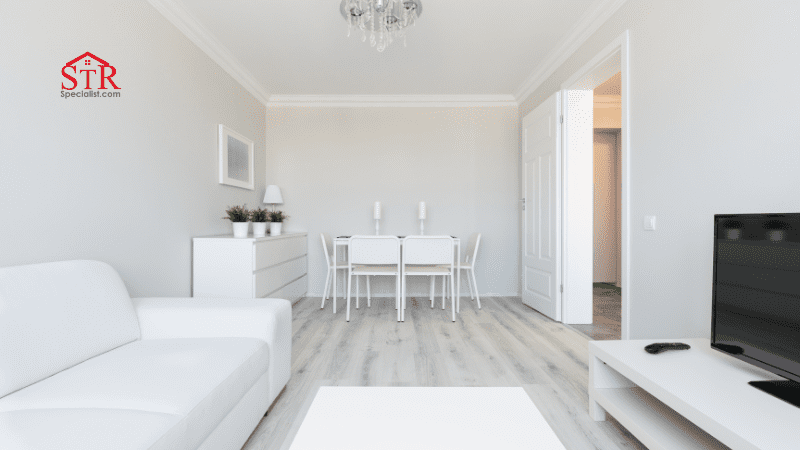
Operating a short-term rental from your residence or an additional property can serve as an effective avenue for supplementary income. As a certified Short-Term Rental Stylist, Airbnb hosts, and investors represent significant clients. It’s crucial to fashion a space that’s both appealing and cozy to draw in guests. Here are five strategies to enhance the style of your Airbnb and entice guests, thereby boosting your earnings potential. Tip 1: Embrace Minimalism Strive for a clean, clutter-free environment when designing your Airbnb. Your guests should feel as though they’ve stepped into a restful holiday retreat, not confronted with the disarray and tension of a typical home. Consider using just a few select pieces of art and plants rather than an abundance of small decor items to establish a serene, tidy ambiance. Above all, it’s essential to remove personal objects like family photos, medicines, and any religious or political items. Your Airbnb guests will appreciate the feeling of staying in a neutral space, rather than in a stranger’s home. Tip 2: Prioritize Comfort Investing in high-quality bedding, cozy pillows, spacious rugs, and fresh towels can significantly enhance the comfort level of your space. These items can help your Airbnb guests feel as though they’re in a lavish and special setting, rather than just occupying someone’s unused room. Consider storing additional blankets in a cabinet, providing little luxuries like high-end lotions and soaps, and placing a few engaging and aesthetically pleasing books on the bedside table for that extra touch of comfort. Tip 3: Emphasize Practicality While aesthetics are important in staging an Airbnb, practicality should never be overlooked. Consider the logistics of cleaning and the needs of your guests. For instance, furniture that provides visible and easily accessible storage can aid guests in maintaining an orderly environment during their stay and ensure they don’t forget their belongings upon departure. Guests will require space for their toiletries, clothing, and personal items. Choosing open shelving over closed closets or cabinets can make it less likely for things to be left behind when guests pack up to depart. Tip 4: Load Up on Amenities Enhance guest satisfaction by offering thoughtfully-chosen amenities such as coffee makers, irons, Wi-Fi, and air conditioning. Opt for amenities that are commonly searched for on Airbnb to attract discerning guests. If guests are specifically looking for certain amenities, like washing machines, dryers, or hairdryers, your listing will appear in their search results, simplifying their decision-making process. Tip 5: Highlight Photography The final piece of advice in our five-step guide to styling Airbnbs and enticing guests emphasizes the significance of photography. Comparable to home staging, photography stands as a critical element when styling an Airbnb. It’s the photos that accompany the listing which influences guests’ decisions on where to stay. In Conclusion In conclusion, implementing these strategies to enhance the style of your Airbnb can greatly improve your guests’ experience and increase your earning potential. Embracing minimalism, prioritizing comfort, emphasizing practicality, loading up on amenities, and highlighting photography are all key factors in creating an appealing and inviting space. By paying attention to these details, you can attract more guests, receive positive reviews, and establish a successful Airbnb rental business. You may also like Airbnb Superhost Checklist The Best Smart Home Devices for Your Airbnb Property: Enhance Your Guests’ Experience and Streamline Your Operations
Identifying the Ideal Location for Your Next Airbnb

The rise in popularity of Airbnb properties is hard to ignore, with both holidaymakers and business travelers increasingly opting for this home-away-from-home style of accommodation over conventional hotels. Consequently, many investors now prefer converting properties into short-term rentals, veering away from the traditional long-term rental model. However, not all purchased properties should be immediately earmarked for Airbnb. Prior to acquiring real estate with the intent to list it on Airbnb, it’s vital to conduct thorough due diligence. A primary point to verify is whether the property is situated in a location that is suitable and desirable for an Airbnb. Guidelines for Selecting the Perfect Site for Your Future Airbnb Property You might be wondering, how do I pinpoint the ideal location for my upcoming Airbnb? Don’t worry, we’ve got you covered. Here are seven practical tips to guide you in identifying the perfect site for your future Airbnb property. 1. Understand Local Laws and Regulations The initial step in selecting an Airbnb location is to verify the legality of such rentals in the prospective city, town, or county. There are places where Airbnb rentals are either prohibited or governed by specific rules, including permit requirements. Ignoring these could lead to serious legal issues. Assuming your desired location allows Airbnb operations, it’s crucial to thoroughly comprehend the legalities involved. Consult a lawyer to draft necessary legal documents to safeguard both you and your potential guests. It’s also beneficial to engage an accountant who can clarify tax implications related to this kind of income. Another aspect to explore is insurance. Certain insurance providers may not offer coverage for short-term rentals, so it’s worthwhile to investigate the kind of insurance your Airbnb might require to operate safely and legally. 2. Investigate the Expense of a Property Management Agent or Firm Should your Airbnb property be located close to your primary residence, there might not be a necessity for a management agent or firm. However, if you plan to list a property situated significantly far from where you live, engaging a property manager could be beneficial to handle tasks like cleaning, maintenance, and guest services. It’s essential to conduct thorough research on the potential costs involved in hiring such a professional or firm. Over-investing in property management could erode your revenue substantially. This research will aid in determining whether or not you require a manager, and if so, assist you in compiling a list of potential candidates for your Airbnb management. 3. Evaluate the Duration of the Tourist Season Aim for an Airbnb property location with a consistent tourist influx and a brief off-season to ensure the property doesn’t remain vacant for extended periods. A short tourist season can significantly reduce your revenue, and an unoccupied property may incur higher maintenance costs. A longer and stable tourist season, driven by year-round attractions, boosts the demand for short-term rentals. Therefore, consider locations where tourists are consistently drawn throughout the year. The area’s climate and its impact on tourist visitation should also factor into your decision-making process. 4. Steer Clear of Major Cities and Tiny Towns Establishing an Airbnb in a large city may not be the wisest choice due to the high prevalence of hotels, which could lower the demand for short-term rentals. Also, securing a suitable, profitable location in a bustling city could pose a challenge. Conversely, extremely small towns may also present difficulties for Airbnb operations. The ideal town size is one that’s neither too large nor too small, which might seem elusive but is indeed feasible. Unless a small town holds a significant tourist attraction, maintaining a thriving Airbnb business there may prove tough without a sufficient population or attractive features to sustain demand. 5. Evaluate the Level of Competition Part of your groundwork should involve assessing the extent of competition in the area where you intend to list your property. This includes both the number of Airbnb listings and hotels already present. High levels of either could mean that your listing might struggle to stand out. Ideally, you should aim to list your property in an area where hotel capacity falls short of meeting the demand from incoming tourists. Similarly, your listing should be in a location with limited Airbnb offerings. A saturated market could decrease the chances of your property being booked and rebooked. 6. Situate your Airbnb Near Well-known Tourist Attractions When selecting a property to list on Airbnb, it’s beneficial to choose a location in close proximity to favored tourist attractions. This could include museums, parks, shopping districts, hiking trails, ski resorts, restaurants, and so forth. Being nearer to these attractions significantly increases the likelihood of guests choosing your listing. Many guests prefer locations that allow them to reach main attractions by foot, making this an ideal scenario for attracting potential renters. 7. Access to Public Transportation and Parking Facilities Location selection for your Airbnb also requires considering the availability and proximity of public transportation. If your targeted town or city has a public transportation system, such as buses, taxis, or subways, it’s beneficial to understand where these stops are. Owning a property near these facilities could potentially make your listing more attractive to guests. Guests typically prefer minimizing travel or walking time to access public transportation, hence the closer your property is to these stops, the more they can optimize their time enjoying the local area. Additionally, guests will appreciate a secure space to park their personal vehicles. Ensure your Airbnb property comes with safe parking options for cars, motorcycles, bikes, and so forth to cater to guests’ needs. Concluding Remarks Not every town or neighborhood lends itself well to an Airbnb listing. As with any business venture, thorough research is key. If you can tick off the seven criteria discussed above, you may be on the path to finding an excellent location for your Airbnb listing. However, remember these tips do not ensure constant bookings or rebookings. Multiple factors influence a guest’s decision to book your Airbnb. Nonetheless, if your prospective Airbnb property aligns with
Essential Guidelines for Requesting Reviews from Airbnb Guests
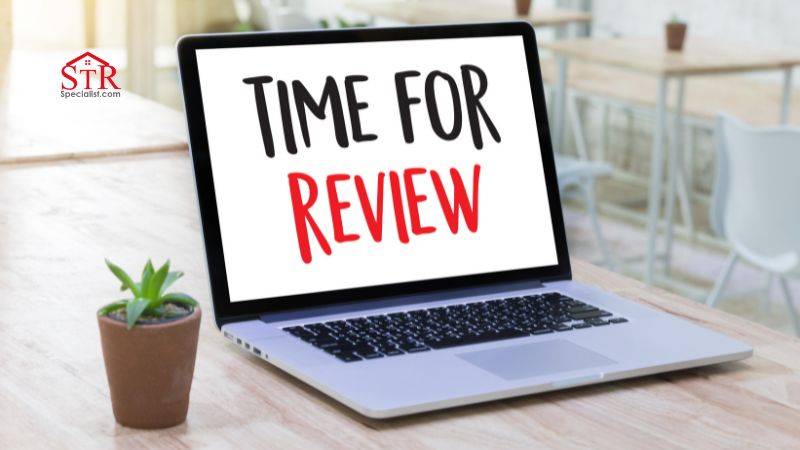
As an Airbnb host, you might have a fantastic property on offer, but without reviews, gaining trust from potential guests can be challenging. Airbnb has revolutionized the hospitality and tourism industry, and reviews undeniably play a pivotal role in swaying guests to book your property. You can promise a five-star stay, but without a guest’s testimonial confirming your claim, it could be difficult for prospective guests to commit to your listing. Online interactions, Airbnb included, thrive on trust. Reviews from previous guests serve to establish this trust for both future guests and hosts. The host benefits in several ways from good reviews, not least of which is the possibility of achieving Superhost status. Other benefits encompass building credibility, attracting more visitors to their listing, potentially increasing the listing’s rank, enhancing its visibility, and elevating booking prospects. More demand inevitably leads to more business, thereby enhancing the host’s income from Airbnb. So, how do you encourage your satisfied guests to provide a review after they’ve enjoyed their stay at your property? Let’s delve into some strategies to effectively prompt your guests to leave reviews on Airbnb. Effective Strategies for Requesting Reviews from Airbnb Guests Reviews on Airbnb play a crucial role and can greatly influence your booking rates. For those new to hosting, eliciting reviews from guests might seem daunting. However, there’s no need to hesitate in asking for what could enhance your success as a host. Here are some tactics to motivate your Airbnb guests to provide reviews for your property. 1. Leaving Reviews for Your Guests Airbnb encourages both hosts and guests to write reviews upon check-out. Neither party can see the other’s review until both have submitted one or after 14 days post-check-out. Providing reviews for each other mutually boosts credibility on the platform, enhancing prospects for future bookings and stays. Ensure that your review is unbiased, truthful, and relevant, all the while adhering to Airbnb’s content policy. When formulating your thoughts about your guest’s stay, bear in mind that people have different styles of communication and ways of inhabiting a rental property. If your house rules were followed, but the guest was less communicative or slightly messier than your previous guest, that doesn’t necessarily merit a less-than-perfect score for communication or cleanliness. Assess the entire interaction in its totality, and if the guest’s stay brought value to your business, review them correspondingly. If a guest failed to abide by your house rules and left a substantial mess, your candid review will be appreciated by other hosts. In addition, Airbnb provides an option to specify whether or not you would consider hosting that guest again. 2. Creating a Positive Check-In Experience The check-in process presents an excellent opportunity to make a strong first impression on your guests. Welcome them warmly and express your commitment to providing an outstanding stay, assuring them that you’ll be readily available to address any requests. Mention that you would appreciate a review at the end of their stay if they are pleased with their experience. Emphasize that while it takes only a few minutes to complete a review, it significantly impacts you and future guests. Don’t forget to thank them in advance for their time and feedback. 3. Incorporating a Welcome Packet Including a welcome packet or a “house manual” as part of your greeting package for guests can be quite beneficial. This handy booklet typically contains tips about local attractions and activities, the Wi-Fi password, and house rules. This packet provides an ideal opportunity to prompt guests to review your Airbnb property. You can even include simple instructions on how to submit a review for those who might be unfamiliar with the process. Don’t worry if you lack the technical or design expertise to create a welcome packet—there are various automated services and affordable, ready-to-print options available from creators on platforms like Etsy. 4. Implementing Visual Reminders Visual reminders placed strategically throughout your property can be a great way to nudge your guests to leave a review. Flyers or stickers with a message like, “Enjoying your stay? Remember to leave a review!” can serve as a friendly prompt. You can also harness the power of technology and showcase your creativity. Consider displaying a framed QR code that guests can scan, directing them straight to your Airbnb listing’s page. This will simplify the review process, making it more convenient for your guests to leave feedback. 5. Directly Requesting Reviews from Guests During Their Stay If you’ve established a friendly rapport and open communication with your guests, it’s perfectly acceptable to ask them for a review. You might say, “Our goal is to provide a 5-star experience; we would appreciate your feedback in a review when the time comes.” However, avoid overdoing it or appearing too desperate for a review. In case of any issues, ensure you act promptly to resolve them. After handling their concerns, inquire if they require any further help, reinforcing that their comfort during their stay is paramount. Once their issues are smoothly resolved, this could be a chance to thank them for seeking assistance and, if they found the resolution satisfactory, to request that they consider mentioning this positive experience in their review. 6. Request for Review: Your Feedback Matters To ensure we capture your valuable feedback while your experience is fresh in your mind, we kindly ask for a review as part of our check-out process. Your review carries greater detail and authenticity when shared promptly. As we express our gratitude for choosing our establishment, we also extend well wishes for your continued travels. We kindly request your final consideration in leaving a review to help us improve our services. In the event that you haven’t had the opportunity to review our property within the 14-day review window after check-out, we may send a follow-up communication via text or email to kindly remind you. Wrapping Up: Encouraging Reviews for Your Airbnb Encouraging guests to write reviews may initially appear challenging, but with the right approach, it becomes more
Optimal Maintenance Routine for Airbnb Properties to Minimize Unavailability
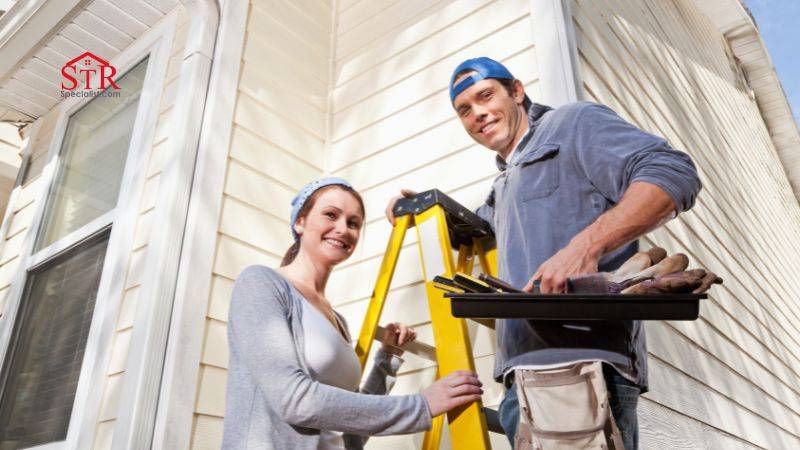
Whether you’re a novice vacation rental owner or a seasoned Airbnb pro, maintenance stands as a pivotal part of your operation. It guarantees the optimal functioning of all facilities, paving the way for a top-notch guest experience. In an ideal scenario, Airbnb properties would follow a rigorous maintenance schedule, swiftly meeting deadlines and expectations without any hitch. However, reality often falls short of this perfection. Most hosts usually end up dealing with maintenance in a reactive manner, addressing issues only after they arise. Implementing a systematic maintenance routine is crucial as it enables hosts to foresee both the requirements of the property and guests. These pointers on structuring an effective maintenance plan illustrate how you can utilize your time and resources more efficiently, ensuring minimal disruption at your Airbnb property. Establish a Routine Maintenance Inspection Plan The initial step in any maintenance routine is to frequently inspect your Airbnb properties. As hosts strive to deliver exceptional guest experiences, they understand the importance of everything running flawlessly, be it consistent water temperature or a fully supplied linen closet. Each Airbnb location needs to function optimally. While numerous checklists exist for maintenance inspections, adopting the strategy used by Airbnb Plus hosts can equip you for your own checks. Review the property’s layout and aesthetics to ensure everything is well-arranged, operational, and pleasing to the eye. Assess in-house appliances, ensuring that elements like cables and unnecessary clutter remain hidden. Examine your security systems, smoke alarms, air conditioning, and even Wi-Fi connectivity to verify their advertised efficiency. Inspect the supplies distributed across the house, from kitchen to bedrooms, ensuring all areas are sufficiently stocked. By assessing all that your Airbnb offers, you can plan maintenance inspections tailored to the duration of guests’ stays, ensuring a consistently pleasing experience. Formulate Standard Operating Procedures (SOPs) The Airbnb market is fiercely competitive, with success largely hinging on average reviews and seasonal booking volumes. While experienced hosts may navigate challenges smoothly, newcomers might experience anxiety when unexpected issues jeopardize their business operations. To minimize disruption, it’s advisable to establish a Standard Operating Procedure (SOP) for property maintenance. With a comprehensive SOP, you can provide clear guidelines for everyone involved in the operation of your Airbnb property. You might even think about developing distinct SOPs for cleaning staff or emergency and maintenance teams, ensuring seamless operation. As a host, it’s essential to recognize that you may not always be available to cater to your guests and their needs in person. In such situations, an SOP allows you to uphold consistency, quality, and punctuality in your service. The SOP offers explicit instructions for managing emergencies such as fires or injuries, as well as non-emergency situations like late arrivals. A practical example of an SOP is the self-check-in feature that allows guests to access the property even in the host’s absence. Digital maintenance assistance apps like Keycafe and Everydoor.io are also useful resources, enabling both keyed and keyless property access for guests and staff, round the clock. Heed Guest Feedback Guest feedback forms a vital part of managing an Airbnb, given that subpar services get exposed to the world via reviews and ratings. To prevent downtimes prompted by negative feedback, it’s essential to take guest complaints seriously. If one guest has raised an issue, there’s a likelihood that another guest might encounter the same problem. Thus, you should keenly pay attention to every piece of feedback from your guests. Common guest grievances often involve issues like air-conditioning malfunctions or pipe leaks. As a host, promptly addressing these maintenance problems as they crop up is beneficial. However, demonstrating true proficiency involves preventing such issues from happening in the first place. For instance, a leaky pipe in the bathroom might appear insignificant initially, but in certain situations, it can make the floor slippery, potentially causing accidents, or even produce an unpleasant, musty smell. As a host, you need to tackle such problems as they emerge. Don’t postpone addressing the issue. Embrace accountability for the problem to foster trust with your guests, recognizing that no Airbnb stay is flawless. Leverage Property Maintenance Software Managing an Airbnb can be as demanding as a full-time job if you’re not familiar with effective strategies. To alleviate stress from juggling myriad responsibilities, consider utilizing property maintenance software. Such software is gaining popularity as a vital tool for streamlining Airbnb operations. For hosts overseeing multiple short-term rentals, maintenance software can automate various tasks, handling routine daily chores while minimizing human error, thus cutting costs. Leading property maintenance software options on the market offer features like guest messaging, review generation, cleaning coordination, and pricing management. These tools offer numerous benefits to hosts, including enhanced guest communication, improved Airbnb ranking, and seamless calendar synchronization. Handling the schedules of multiple Airbnb properties becomes more manageable with software that assists in honing your skills as a host. Maintain Comprehensive Maintenance Records No maintenance plan is truly complete without maintaining meticulous logs or records. As an Airbnb host, keeping a record of all equipment and their operational status enhances your responsiveness. Instead of relying on assumptions or reacting solely to emergencies, logs bring data-driven insights into your maintenance strategy. While keeping maintenance logs might not be the most thrilling part of managing an Airbnb, it’s an essential aspect for ensuring efficiency. When transforming spaces into Airbnb properties, there are numerous aspects to consider, including purchases and installations. Maintenance records offer a reference that helps guide your actions when guests report faults or necessary repairs. For instance, maintenance logs can detail the models, serial numbers, manufacturers, and warranties of your valuable items. Therefore, when repairs or other activities are required, your maintenance records safeguard you and eliminate uncertainty from your routine maintenance efforts. Always Be Ready for Maintenance in Airbnb Operations Operating an Airbnb hinges on the hosts’ capacity to deliver an exceptional vacation experience for guests. In practice, this involves predicting their needs during the stay and swiftly addressing any emerging issues. While no maintenance schedule can claim perfection, these tips underscore that
Is It Worth Investing in Themed Airbnbs?
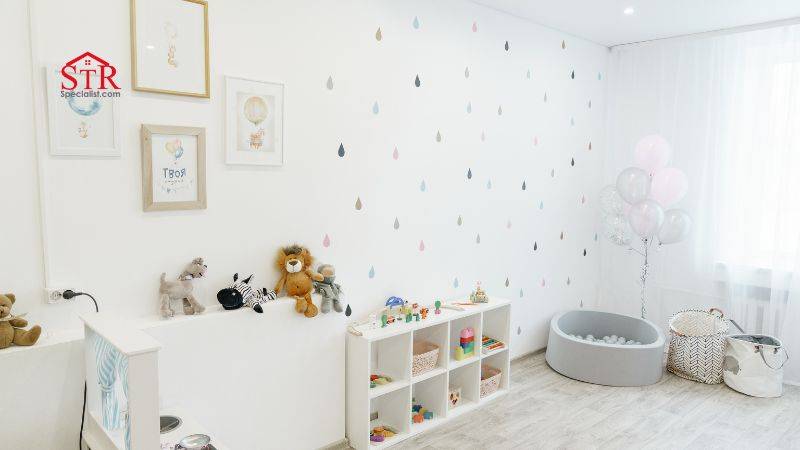
The trend in modern travel is all about deeply engaging with local culture, staying somewhere that gives you a sense of home away from home. This makes themed Airbnb an ideal choice, particularly for those traveling in a group or with a partner. But the question remains, are these themed Airbnbs really worth the investment? Airbnb’s Themed Options Airbnb patrons have consistently shown a preference for themed accommodations, and in response, the availability of such stays has significantly expanded in recent years. Some hosts curate spaces inspired by themes such as the Beatles, the ’80s, or even Luxury, aiming to provide unique experiences that guests wouldn’t typically have at their own homes. However, it’s worth noting that some of these themes might not resonate with every visitor. Securing Airbnb bookings during high-traffic seasons is typically less difficult; however, maintaining a steady flow of guests year-round poses a greater challenge for hosts. An Airbnb with a strong thematic concept is more likely to attract bookings consistently across the year, rather than only in peak periods. Factors to Take Into Account If you’re planning to adopt a theme for your Airbnb property, it’s essential to ensure it’s immersive and not distracting. Your guests should be able to fully engage with the intended theme. Here are some tips: Superhost Role: It’s crucial to be readily available for your guests. Show them around your property through images, and personally, if possible, highlighting all the elements that enhance your chosen theme. Additionally, use descriptive words fitting your theme (like ‘magical’, ‘radical’, or ‘serene’) in your property description. Lighting: The level and style of lighting can greatly impact how your theme is perceived. Not only is the right amount of light crucial for visibility, but the lighting fixtures themselves can also contribute to the theme, setting the appropriate mood. And don’t forget to capitalize on natural light! Theme Inspiration: When considering which theme to choose, reflect on what you appreciate most about your location. You may find the perfect theme closer than you think. Consistency in Theme: Trying to incorporate too many design elements or themes can result in a confusing aesthetic. For example, a straightforward beach house theme might be disrupted by the introduction of pirate elements. While there’s some correlation, the sleek, tranquil appeal of a beach house shouldn’t be disrupted by pirate chaos. It’s best to select one theme and adhere to it consistently. Minimize Language Obstacles Offering your listing in multiple languages can be beneficial, as not all Airbnb users are fluent in English. Translating your listing can thus increase your bookings. The numerous advantages of translating your Airbnb listing include: Enhanced Booking Opportunities: A translated listing can increase your chances of securing more bookings, thereby boosting your income. Broadened Guest Reach: By making your listing available in various languages, you’ll be able to appeal to a larger and more diverse pool of potential guests. Professional Presentation: A listing that’s available in multiple languages can appear more professional compared to those solely in English. Localization: You can translate your listing into up to five languages. This is a crucial step if your Airbnb is located in a city that attracts significant tourist traffic, ensuring you cater effectively to a global audience. Steps for Thematic Design of Your Property Airbnb primarily focuses on curating and facilitating unique experiences. While the platform certainly caters to the rental of extra rooms or even couches, it stands out due to the tours, classes, and hikes offered by Airbnb hosts. It’s all about individualized experiences, and your space should be designed to deliver just that. But how about enhancing these experiences with a theme that transforms your property into an immersive adventure? In selecting a theme, consider something that aligns with your local area, country, or regional history. Using the natural environment as the basis of your theme is a popular approach and often receives high appreciation from guests. Your choice of theme for your Airbnb is ultimately only constrained by your creativity. Here are some suggestions to kickstart your brainstorming: Theme Selection: Consider your surroundings and their history. Are you near mountains, a beach, or a local theme park? For inspiration, take a look at this Disney/Universal-themed Airbnb in Florida. Decor: Start with what you already have and gradually introduce new items to create a more unified theme. If resources allow, consider adding built-in beds, children’s play areas, or outdoor activities that align with your theme. Online Updates: Once you’ve revamped your property, ensure you update your listing so potential guests can see your new theme. This might involve new photographs and a rewritten description. Remember to include keywords to enhance your listing’s searchability. Neutral Approach: If you’re working with a limited budget or lack decorating experience, keep your changes minimal. Tackle one room at a time; you don’t need to complete the whole house at once. Some guests might appreciate having a few quieter, more neutral areas to relax in if other parts of the property are heavily themed. Themed Events: Keeping your setting fresh and updated can be appealing to guests. You could consider theme shifts to celebrate holidays or major events like the Olympics. These “themed events” could help attract bookings during slower periods. Wall Art: Walls provide a vast canvas to enhance your theme. Use pictures, paintings, or even murals to elevate the thematic experience. While some parts of your Airbnb might be more subdued, others can be lively and imaginative. Children particularly enjoy spaces adorned with their favorite characters, making their rooms ideal for murals featuring the likes of Spiderman or Queen Elsa. In Summary Airbnb guests are seeking more than just accommodation; they desire an enriching and authentic experience. Airbnb’s “Experiences” initiative has been designed to foster a deeper connection between hosts and guests, enhancing the value of their trip. It enables guests to book tours, guided activities, classes, restaurants, nightlife spots, and various other experiences. Alternatively, they can choose to fully immerse themselves in the unique atmosphere of
Understanding Airbnb’s Review Policy: An In-Depth Analysis

The cornerstone of the Airbnb community is trust, cultivated through the exchange of reviews between hosts and guests. The Airbnb review policy enables both parties to provide transparent feedback, aiding them in making savvy decisions regarding bookings and hosting. This article aims to shed light on the intricacies of the Airbnb review process. We’ll delve into the nitty-gritty of the Airbnb Review Policy, as well as guide you on how to pursue the deletion of a vengeful review and how to modify an existing Airbnb review. The Policy for Reviews on Airbnb Airbnb stresses the importance of maintaining a review policy that supports authenticity, reliability, and value in the feedback exchanged between hosts and guests. The Airbnb Review Policy mandates that all reviews should be impartial, fact-based, and should accurately encapsulate the real experience of the reviewer during their stay or Airbnb Experience. Furthermore, every review must be compliant with the Airbnb Content Policy. Let’s delve into the functionality of the review system on Airbnb: Airbnb enables both hosts and guests to pen reviews for stays that have been booked and paid for on this rental listing platform. After checkout, hosts and guests are given a 14-day period to leave their reviews. Reviews get published once both the host and guest have submitted their respective reviews, or once the 14-day timeframe has concluded. If a review left for you doesn’t resonate with your experience, you’re entitled to submit a public response within 30 days after the review has been posted, allowing you to provide your own viewpoint. While you can’t expunge a review you find objectionable, you’re permitted to report it if you believe it contravenes the Airbnb Review Policy. Securing a multitude of positive reviews is pivotal for a thriving Airbnb business. 5-star reviews not only enhance your search ranking on Airbnb but also lend credibility to your listing, attract a larger number of guests, and consequently, boost bookings and profits. It’s crucial to prompt your guests to provide a sincere review reflecting their unique experience. How can you do this? By reaching out to your guests and reminding them to give their feedback before their check-out. Upon submitting your review, Airbnb will prompt your guests to reciprocate the gesture. If they’ve had an enjoyable and memorable stay, they’re more likely to respond positively. One effective method is to create multiple review templates to save time in crafting unique responses after each stay. However, a more efficient strategy is to automate the entire Airbnb host review process utilizing platforms like Hospitable.com. All you need to do is configure your review templates, and Hospitable will randomize, personalize, and dispatch them on your behalf. If you suspect your guest may not have been fully satisfied with their stay, it’s advisable not to post a review immediately after their checkout. This gives the guest time to reflect and perhaps even overlook leaving a review within the 14-day window if Airbnb does not prompt them to do so, since you haven’t submitted your review yet. By leveraging the capabilities of Hospitable, you can adeptly handle unfavorable reviews. Simply activate the ‘Bad Review’ feature for a pending review associated with a problematic guest, and your review will be postponed until the final moment, giving you a strategic advantage. Airbnb’s Guidelines on Review Removal Airbnb strongly promotes the exchange of open and truthful reviews between hosts and guests, however, it does not prescreen reviews before publishing. In general, Airbnb stays out of disputes over the accuracy of reviews. While hosts can’t expunge unfavorable reviews left by guests, they can reach out to Airbnb and request the deletion of a review if it infringes upon the Airbnb Review Policy.According to Airbnb, a review may be subject to removal under the following circumstances: The review infringes upon Airbnb’s Content Policy. For instance, if it contains discriminatory language, promotes violence, or includes threatening content or private/confidential information. The review displays signs of bias. This may occur if the guest was given incentives to leave a positive review, such as a discounted or free stay, or if there are indications that the booking was engineered purely to bolster the host’s overall rating. The review does not directly pertain to the author’s personal experience. For example, if it lacks firsthand information about the host, guest, or stay that could assist other members of the Airbnb community in making informed booking or hosting decisions. Both hosts and guests have the option to delete a review they’ve authored if it ceases to accurately represent their authentic experience as a host or a guest. If you wish to remove a review you’ve previously posted, you can reach out to Airbnb’s customer support team and request the removal of the published review. As of November 2022, Airbnb has revised its review removal policy to provide greater safeguards for hosts against vindictive reviews. Hosts now have the right to challenge retaliatory reviews, regardless of their posting date, if they were submitted by guests who committed severe infractions such as: Violating the stipulated house rules of the listing Extending their stay beyond the agreed reservation period Causing damage to the property Hosting unauthorized parties When contesting a review, it’s necessary to supply evidence supporting your claim, like photographs or conversation threads with the guests. However, there’s no assurance that a vindictive review will be expunged. Regrettably, despite your best efforts to deliver a flawless stay, a guest may leave a negative review. While this can be disheartening, it’s essential to keep your emotions in control. Allocate some time to thoroughly peruse the review and try to discern what went wrong. This insight can help you avert similar issues in the future. Always address negative Airbnb reviews promptly to provide additional context, respond to the guest’s comments, or offer your viewpoint. This can help to lessen the potential harm a poor review might inflict on your listing. Acknowledge the guest’s less than satisfactory experience and extend an apology even if you don’t align with their interpretation of events. Express understanding and gratitude for their feedback as it can assist
State-by-State Regulations for Airbnb: A Guide to Licensing, Taxation, and Additional Requirements

The United States, with its vast expanse and diverse opportunities, presents a plethora of prospects for budding investors interested in purchasing a property to list on Airbnb. However, before venturing into the short-term rental market, it’s crucial to familiarize yourself with the local laws and regulations governing your area. The challenge lies in the highly localized nature of these short-term rental laws, which can often be convoluted. Furthermore, certain municipalities might impose restrictions on short-term rentals in a bid to regulate the swift proliferation of Airbnb listings. So, if the idea of transforming your property into a holiday rental has crossed your mind, this guide provides insight into various facets of existing state-specific Airbnb regulations. We delve into the short-term rental laws that apply in well-known Airbnb investment destinations and shed light on specific regulations within popular vacation rental locales. Moreover, our beginner’s guide to Airbnb hosting may prove to be a valuable resource. It encompasses all the fundamental steps required to excel as a short-term rental host. Regulations for Airbnb: A State and City Perspective Since its inception in 2008, Airbnb has significantly disrupted the vacation rental industry by providing travelers with cost-effective alternatives to traditional accommodations. For homeowners, the short-term rental platform has emerged as a lucrative means to supplement their income through a real estate side business. However, an increasing number of states and cities throughout the US have been implementing stringent regulations on Airbnb and other vacation rentals, and these rules can differ significantly from one locale to another. Please note that the regulations concerning Airbnb within the United States are continuously evolving, and this document should not be interpreted as legal advice. It’s imperative that you perform due diligence and seek guidance from a local attorney to ensure compliance with the applicable laws and regulations. Familiarizing yourself with the prevailing short-term rental regulations in your city is pivotal for the prosperity of your enterprise. After establishing your business, consider employing vacation rental software such as Hospitable.com to streamline your operations. Hospitable offers features like automated messaging with guests through ChatGPT integration, synchronization of calendars across major OTA platforms, automatic assignment of tasks to your team, and more. Regulations for Airbnb in Florida Under Florida’s state law, local authorities are barred from outrightly prohibiting short-term rentals or restricting the duration or frequency of rental stays. This policy positions Florida as a favored destination for individuals keen on investing in vacation properties. However, county and city administrations maintain the authority to establish their own regulations to mitigate the potential adverse effects of vacation rentals on local neighborhoods. Licensing requirements In Florida, all vacation rentals, inclusive of Airbnbs, necessitate a license from the Florida Department of Business and Professional Regulation (DBPR). If you plan on listing an entire unit for short-term rental more than thrice a year or advertise it as regularly available for guests, obtaining a DBPR license is mandatory. However, if you’re interested in renting out a single room or multiple rooms that do not fall under the public lodging category, a DBPR license may not be required. Nevertheless, these rentals might still need to comply with other regulations set at the city, county, or local level. Tax Obligations Operators of Short-Term Rentals (STRs) in Florida are subject to various taxes, as outlined below: Income Tax: This tax is paid annually to both federal and state governments. State Sales Tax: Payable to the Florida Department of Revenue, the rate stands at 6% in Florida. County-imposed Sales Surtax: This rate differs based on the county. The specific county rates can be found on the DR-15DSS form. Local Option Transient Rental Tax: The rates for this tax also fluctuate among counties. You can find the county-specific rates and guidelines for reporting and payment on the DR-15TDT form. Regulations for Short-Term Rentals in Kissimmee, FL In Kissimmee, short-term rentals encompass guest stays that last less than six months. Operating a short-term rental business is permitted solely within designated zoning districts. It’s advisable to liaise with the City of Kissimmee Planning Division to ascertain whether your proposed listing aligns with the zoning stipulations or usage definitions. Additionally, property owners intending to embark on a short-term rental enterprise must secure a Business Tax Receipt prior to initiation. Regulations for Short-Term Rentals in Miami, FL In Miami, vacation rental properties listed as Estate or Low-Density Residential on the CDMP Land Use Map Plan face certain restrictions. The Responsible Party, typically the owner, must reside in the property for more than half the calendar year. Furthermore, rentals can only occur concurrently with the Responsible Party’s residency. For all Miami vacation rentals, the maximum overnight occupancy is restricted to 2 persons per bedroom plus an additional two persons per property. The total overnight occupancy should not exceed 12 individuals, not counting children under three years old. Regulations for Short-Term Rentals in New York State New York State law considers any dwelling rented for less than 30 consecutive days as a short-term rental, but for tax purposes, they are defined as reservations lasting fewer than 90 consecutive days. At the state level, the New York State Multiple Dwelling Law governs short-term rentals, prohibiting them in residential multifamily buildings or “Class A” multiple dwellings. However, renting out a room within most apartment buildings could be permissible if the permanent resident remains present during the guest’s stay. Hence, part-property rentals that are owner-occupied may be a feasible option if the entire apartment is accessible to the paying guest. Licensing and Taxes While there are no uniform requirements for short-term rental licenses and permits across the state, most cities and towns uphold stringent licensing regulations for vacation rentals. New York vacation rentals are subject to a state sales tax of 4%, local sales taxes, and local lodging taxes. Vacation rental owners need to register with the New York State Department of Taxation and Finance to obtain a sales tax certificate of authority. Regulations for Short-Term Rentals in New York City New York City enforces strict short-term rental regulations
Guidelines for Conducting Home Repairs While Hosting Airbnb Guests
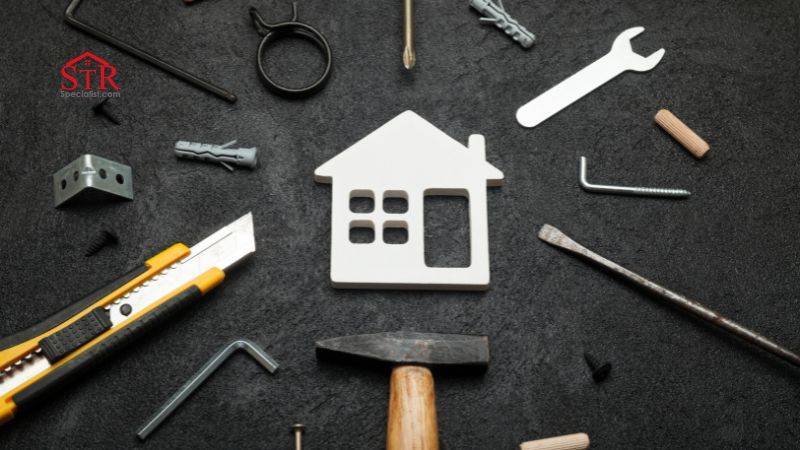
As you watch the water spewing from beneath your bathroom sink, you think, “This is a disaster.” The calm oasis has suddenly become reminiscent of Yellowstone’s Old Faithful. As you cautiously enter the bathroom to stop the water flow, thoughts of cleaning up this catastrophe start flooding your mind. The situation is further complicated with Airbnb guests sharing your space amidst these home repairs. How do you navigate this predicament? Being an Airbnb host, it’s beneficial to establish a contingency plan for potential home repairs during guest occupancy. Whether the cause is an inadvertent mishap by a guest or a breakdown of appliances, preparedness is key. Prepare in Advance for Home Maintenance Issues Being proactive and planning ahead is always wise. While we’d ideally like to schedule house repairs during periods without guests, accidents and unforeseen breakdowns can occur. Keep contact details of a trusted repair technician readily available. Be clear on whom to call in such situations. Maintain a comprehensive list of reliable local repair services, ranging from plumbers to electricians to animal control – even animal-related damages may demand immediate attention. Equip your guests with a repair protocol and a compilation of emergency contact numbers. This way, the issue is more likely to be handled in a way that aligns with your preferences. Include guidelines in your House Manual or somewhere in your rental space on how to communicate with you in case of an emergency or repair requirement. Regular maintenance is key. By keeping everything in top condition, you reduce the chances of facing emergency repairs. Keep an updated visual record of your home and significant appliances, taken before and after each stay. These photographs will simplify the process of determining whether the damage is new or preexisting. Consider investing in a home warranty or service contracts with utility providers or other repair agencies. By paying an annual fee, you secure a service contract that covers repair or replacement, potentially with the added advantage of priority service. Evaluate the Circumstances So, your guests have reached out with a problem – something is damaged. The first step is to evaluate the scenario. There are certain aspects you need to understand before initiating the repair process. What is the issue at hand? Identifying the problem will help you determine whether it’s something you can fix personally or if a professional is required. Does postponing the repairs exacerbate the issue? Although you don’t want to disrupt your guests’ stay, certain situations, like a sewage leak, can worsen if left unattended. Who is accountable? Ascertaining this early on is crucial. No one wants to dispute over who will bear the expense. Is immediate repair necessary? Assess along with your guests whether the issue demands immediate attention or if it can be deferred until their stay concludes. For instance, if the heating system fails but the guests are amenable to using the Airbnb’s wood stove, both parties might agree to defer the professional repair until after their departure. On the other hand, a malfunctioning air conditioner amidst a heatwave necessitates immediate action. Ensure Clear Communication and Thorough Documentation Absence of information can exacerbate an already complex situation. Leveraging the Airbnb messaging system ensures uniform understanding among you, your guests, and Airbnb. This system can serve as crucial documentation to avoid cancellation fees, if necessary. Always use Airbnb’s messaging system for crucial communications with your guests. If you’re not at home or in close proximity, ask your guests to provide a detailed description of the problem or send a co-host if available. Request pictures, if possible. Make it clear whether you are taking responsibility for the damage or if you plan to utilize the Resolution Center to recover damages through the guest’s registered payment method. Go the extra mile in being helpful and accommodating during the repair process. If guests need to vacate the premises temporarily, suggest local attractions or dining options. You might even offer a gift certificate as a thoughtful gesture. Based on the gravity of the situation, consider a partial refund of their payment. If the guests feel the need to shift to another accommodation, collaborate with Airbnb to find an alternative host. Ensure you communicate promptly and frequently with Airbnb. Don’t assume the company is aware of the scenario just because you’re using their messaging platform. Retain copies of all bills or receipts for potential submission to Airbnb and your insurance provider, if required. Establish Guidelines for Home Repairs Setting up specific protocols for home repairs ensures immediate alignment between all involved parties. This preemptive measure eliminates guesswork and enhances safety in case of serious incidents, such as a ruptured gas line or, in more extreme cases, a partial ceiling collapse. Having a clear plan of action mitigates panic. A standard, well-prepared response not only provides reassurance but also accelerates the problem-solving process. Incorporating these protocols into your rental agreement or house manual can safeguard you against potential liabilities and legal complications. In Conclusion Implementing a protocol for handling repairs during an Airbnb guest’s stay can significantly reduce inconvenience and time wastage for all parties involved. An astute host will have a well-conceived plan prepared in advance and accessible to their guests. Echoing the words of Maya Angelou, we should always aim to “Hope for the best, prepare for the worst, and remain unsurprised by anything in between.” You may also like: The Best Smart Home Devices for Your Airbnb Property Airbnb Check Out Instructions Template – Host Essential
Dealing with Airbnb Refund Pursuers: A Guide
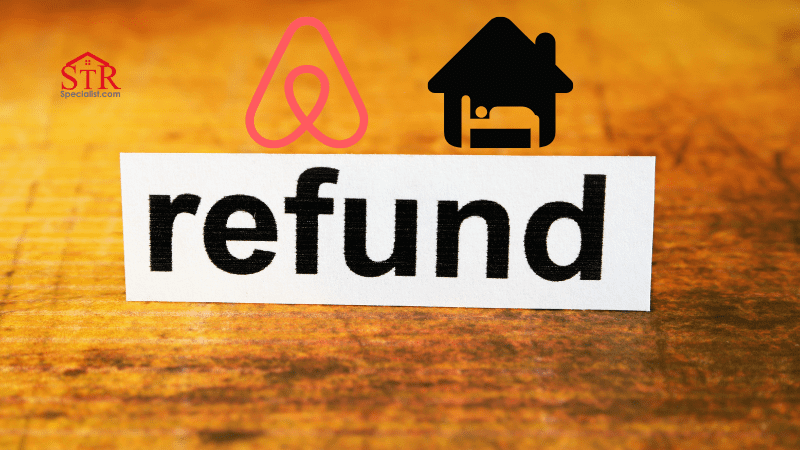
Airbnb’s innovation has opened up opportunities for anyone to lease anything from a single room to an entire home in various locations around the world for any duration. However, one downside for Airbnb hosts is dealing with guests who abruptly cancel their bookings and request refunds. Circumstances That Could Prompt a Guest to Request a Refund Before opening your space to guests via the Airbnb platform, there are certain fundamental prerequisites to be met. These include the following: Act swiftly to inquiries and reservation proposals. Approve impending booking requests. Treat reservations with respect. Don’t sidestep cancellation inquiries. Maintain favorable reviews for your accommodation. Provide all the promised amenities on your premises. Not complying with these guidelines could potentially lead to a guest asking for a refund. Essential Facilities Hosts Should Offer to Minimize Refund Claims from Guests For a guest’s comfortable stay, hosts are required to furnish certain necessary amenities. These include: Sufficient toilet paper Hand and body wash Fresh towels A pillow for each guest Clean bed linen and duvet covers for the beds Typical Reasons Airbnb Guests May Request a Refund Airbnb might validate a guest’s refund plea for several reasons, including: A host delaying the cancellation of guest reservations Guests being inadvertently locked out of the property Inadequate or sluggish internet connection Inaccurate depiction of the property in the listing Unclean and unsanitary conditions in the house Inadequate basic facilities, such as the absence of soap or clean towels Subpar host responsiveness to guest issues. Ways for Hosts to Minimize Refund Claims from Guests Excessive refund requests can stall your business operations. Moreover, those seeking refunds could leave detrimental reviews that might harm your Airbnb enterprise. To dodge such refund requests, consider the following strategies: Ensure Precise Property Description It’s crucial that your property includes everything mentioned in your listing and that all facilities are functional for guest use. Prospective guests filter accommodation options based on these listed attributes. For instance, if you claim to provide Wi-Fi services and a guest finds it absent, it could lead to a negative review. They may also opt to cancel the reservation and seek a refund. Provide Necessary Facilities Ensuring the availability of essential amenities, such as clean beds and towels, makes your property more appealing. Nobody wishes to stay in a place lacking basic items like soap and toilet paper. Depending on your property’s guest capacity, ensure adequate supplies are stocked, with additional reserves for any unforeseen circumstances. Steer Clear of Eleventh-Hour Reservation Cancellations Many Airbnb guests are travelers with set itineraries. Abruptly canceling reservations close to their arrival could disrupt their plans. Such cancellations may lead to negative reviews and refund requests. Airbnb maintains stringent rules around hosts canceling reservations. If found culpable, they might even terminate your hosting agreement. How Can Hosts Process a Refund for an Airbnb Guest? Even with the utmost diligence, a guest might still cancel their reservation or seek a refund. If a guest cancels prior to their stay, Airbnb uses your cancellation policy to calculate the refund amount. It’s essential to set a policy that suits your hosting model. Establish a Cancellation Policy Cancellation policies safeguard you against unforeseen guest cancellations, compelling guests to contemplate the financial implications of their decision. Airbnb offers several policy options for hosts, including: Flexible Policy True to its name, this policy is highly accommodating. It permits guests to cancel reservations up to 24 hours before check-in. Should they cancel within this period, they receive a full refund. However, if they cancel beyond this window or have already commenced their stay, you’ll be compensated for the nights they’ve occupied plus one additional night. Moderate Policy This policy allows guests to cancel their bookings up to five days prior to check-in. Should they cancel within this timeframe, they’re entitled to a full refund. However, if a guest cancels after starting their stay, they’re liable for the cost of each night stayed plus one additional night. Additionally, you’re entitled to retain half of the amount for the remaining unused nights. Strict Policy This policy necessitates guests to cancel reservations within 48 hours of booking and at least two weeks prior to their arrival. If they cancel within this period, they receive 50% of their money back. If they miss the deadline, you retain the full payment. Strict Long-Term Policy Reservations of 28 nights or more are classified as long-term stays. Under the Strict Long-Term Policy, guests are required to cancel within 48 hours of making the booking, and at least 28 days prior to their check-in date. If a guest cancels after their stay has begun, they’re charged for the nights they occupied, in addition to up to thirty extra nights. Flexible Long-Term Policy This policy requires guests to cancel at least 30 days before their planned arrival date. If they fail to do this, hosts are compensated for every night the guest has stayed, plus up to an additional 30 days. Non-Refundable Policy To protect your Airbnb business against cancellations, you could opt for the non-refundable policy. This allows you to keep 100% of the payment even if the guest cancels their booking. However, this option might deter potential guests who prefer properties offering a refund guarantee. Procedure for Processing an Airbnb Guest Refund In case of a reservation cancellation initiated by the host, you’re obligated to provide a full refund. You can facilitate this via your Airbnb app or the desktop site by navigating to the resolution center and selecting ‘send money’, then specify the reason for the transaction. Alternatively, you could reach out to Airbnb directly, via phone or their messaging portal, and request that a refund be issued to the guest. Guests may request a refund either before or after checking into your property. If they cancel prior to check-in, the system automatically processes their refund based on your cancellation policy. If they have already commenced their stay, you’ll need Airbnb’s assistance to facilitate the refund through the Resolution Center. Conclusion There are occasions when


